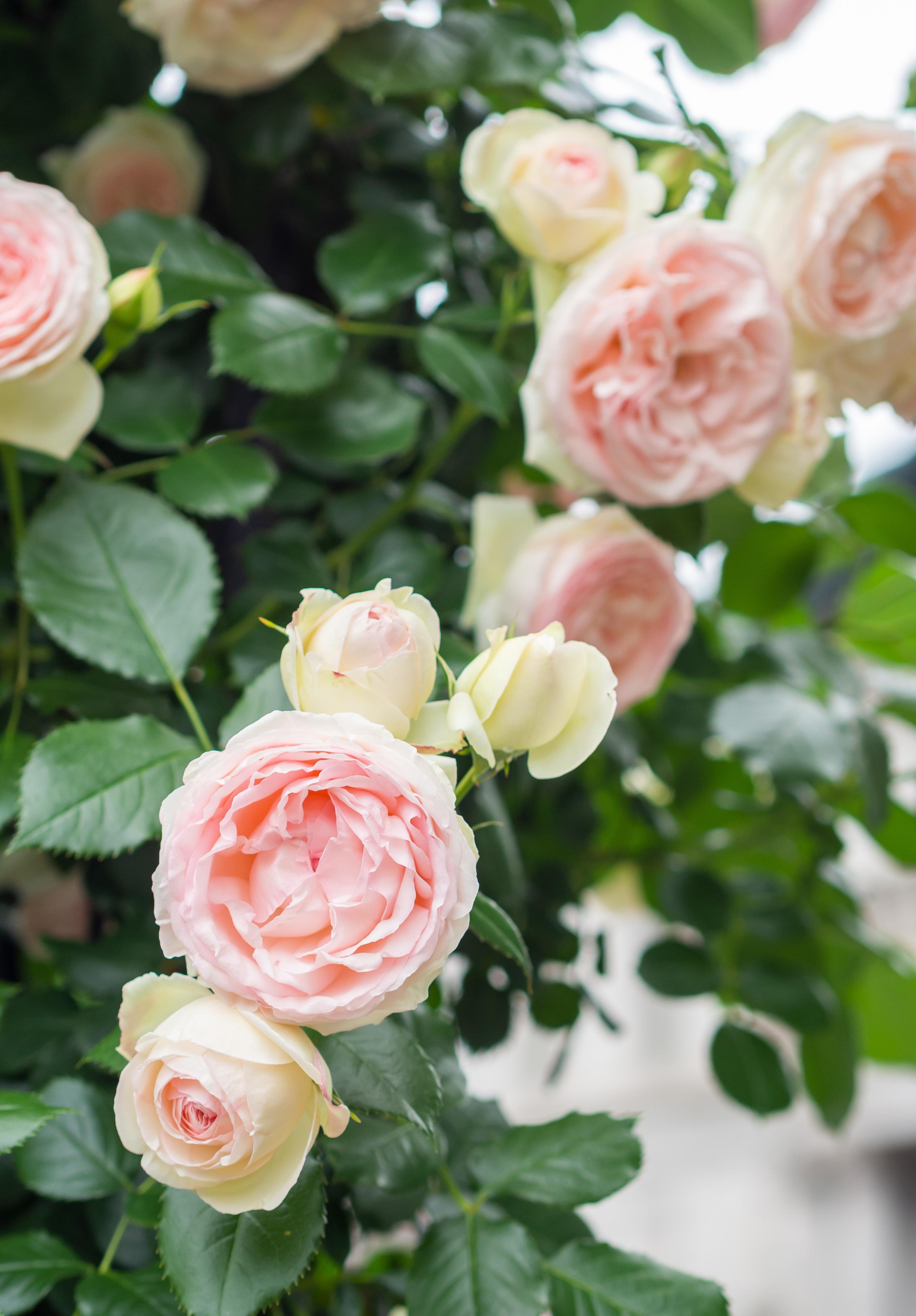
WINTER 2023 Scoop Navigating The COST OF EATING Saving this winter might be easier than you think A Beginner's Guide To DECIDUOUS FRUIT Your backyard orchard begins here Rose Tips For BEAUTIFUL BLOOMS Our top rose varieties of the season and tips to grow well ROF T H E LO V E OF P L STNA FREE ISSUE


Wonderful Wednesdays OW N D ERFU
WEDNE
SuperGold card holders can make every Wednesday wonderful by getting 10% off almost everything when you sign up to our Garden Club and show your SuperGold card instore!* *Wonderful Wednesday Club is only valid for Super Gold Cardholders. 10% discount is only valid on Wednesdays and excludes Kings Gift Cards/vouchers, Vegepods, greenhouses, Birdies garden beds, Morris & James, and magazines. Discount is off the original individual price and not valid in conjunction with any other specials.
L
S YAD
We’re proud to be plant-people, but we’re chuffed to find out our customers think we’re as good with people as we are plants. So good that we’ve won our third gold medal in the Reader’s Digest Quality Service Awards. Thank you to everyone who voted for us. We are so pleased we have been able to help so many Kiwis grow well.

The Staples What's Happening ........................... 4 Catch up on all things Kings and what's happening this winter Gardeners’ Mail ................................ 5 Celebrating your garden success stories Plant Doctor ...................................... 6 Your questions, our expert advice Little Growers Corner 7 DIY bird feeders + a chance to WIN! What We’re Loving ........................... 8 Some of our top winter plants Indoor Plants .................................. 20 Tips and styling advice for the season Winter Recipe 24 Produce your own pasta e fagioli Winter Checklists ........................... 26 What to plant and tend to this winter The Features Navigating the Cost of Eating ......... 11 Tips to grow your own produce Growing From Seed 12 Our hot tips for sowing seeds in the cooler weather Winter Colour .................................. 14 Brighten up your garden with the colours of the season Rose Tips For Beautiful Blooms 16 Our top seasonal roses and grow well tips for planting and pruning Guide to Deciduous Fruit .............. 22 Our beginner's guide to help you dive into the world of deciduous fruit ★ ★ ★ 2 0 2 1 • Votedby 0 2 1
old WINTER 2023 Contents
Gar
Gar
WHAT’S HAPPENING At Kings
After what’s felt like a brief summer and autumn, winter is now upon us. There is plenty to look forward to in winterour veggie gardens will start to reward us with tasty winter harvests, while our winter blooms and foliage will brighten up those darker days with their vibrant colour. Later in the season, some of our early spring bulbs may even start to flower, plus it’s never too early to start prepping for spring.
Getting into the garden is an amazing way of grounding yourself and clearing your mind. Even though the days are shorter, we encourage you to spend some time under the sun, nourishing your garden and unwinding in an area that reflects your personality and growth. Look after your garden and it will look after you.
In this issue of Scoop, we bring you the usual staples of indoor plants, garden checklists and Plant Doctor tips, along with articles on roses, deciduous fruit trees, and more. The increasing cost of living is a hot topic for kiwis, and we’re all looking for ways to ease the strain on our pockets. Growing your own veggies is an easy and cost-effective way, so we’ve included an article to help you get started.
Remember that Kings is here to help you every step of the way. Whether you’re a beginner or a seasoned pro, if you’ve got a plant question on your mind, reach out to us online or visit your local garden experts at any of our eight stores across Auckland.
Grow well this winter. The Kings Team
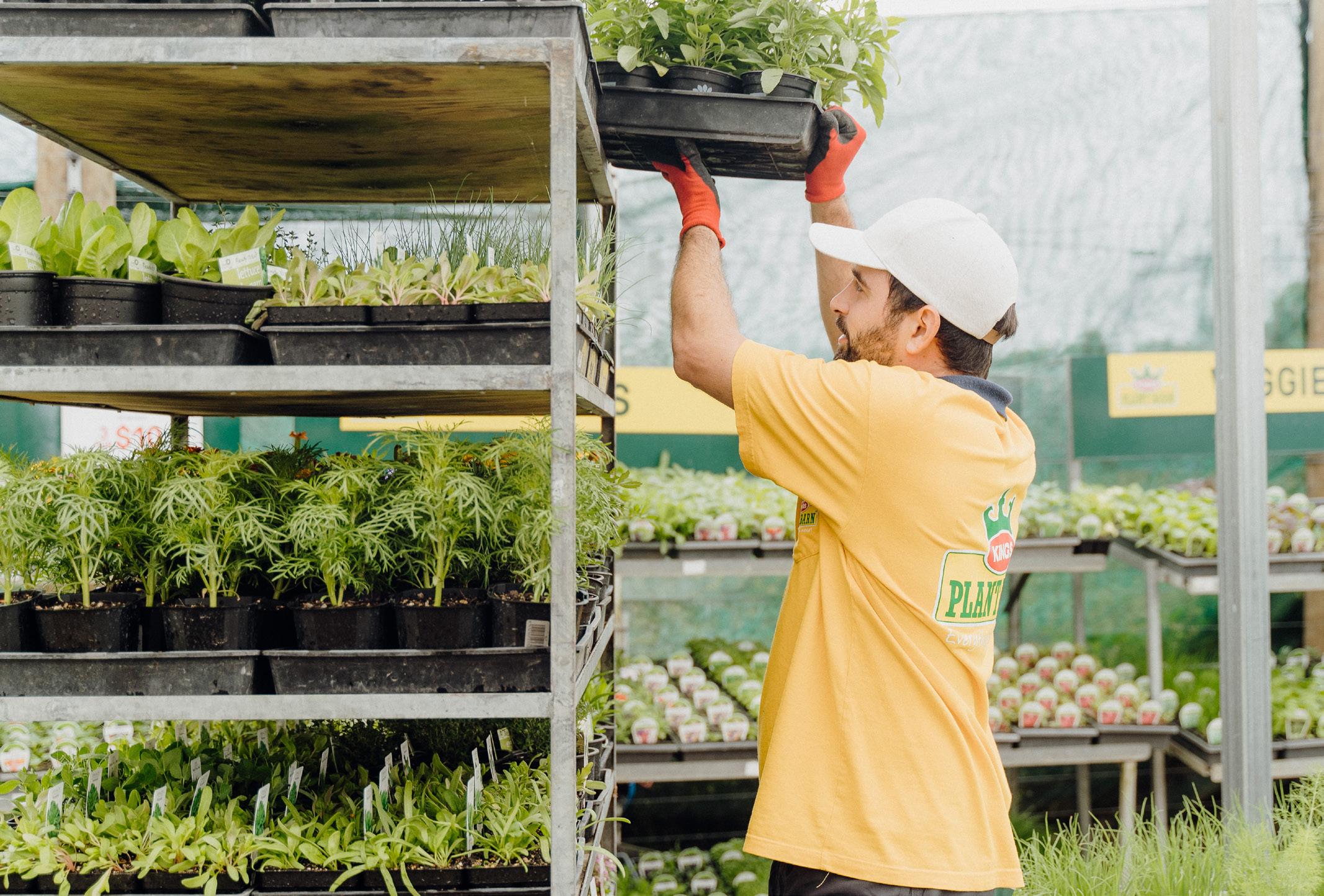
4
CELEBRATING YOUR SUCCESS Gardeners’ Mail

Versatile Pots
Over the years I’ve packed my small garden full of trees, shrubs and bedding plants with the help of Kings. But my patio spaces have been a bit lacking of late. Determined to fix that and following a few visits to my local Kings Store I picked out a good selection of stylish pots. The best thing wasn’t just the pots, but the advice to plant them up so they'd work equally well for the inside as well as outside. It was great advice – thanks Kings. The end result is awesome, especially their suggestion of the tropical looking Philodenron Shangri-la. They look great under my trees outside!
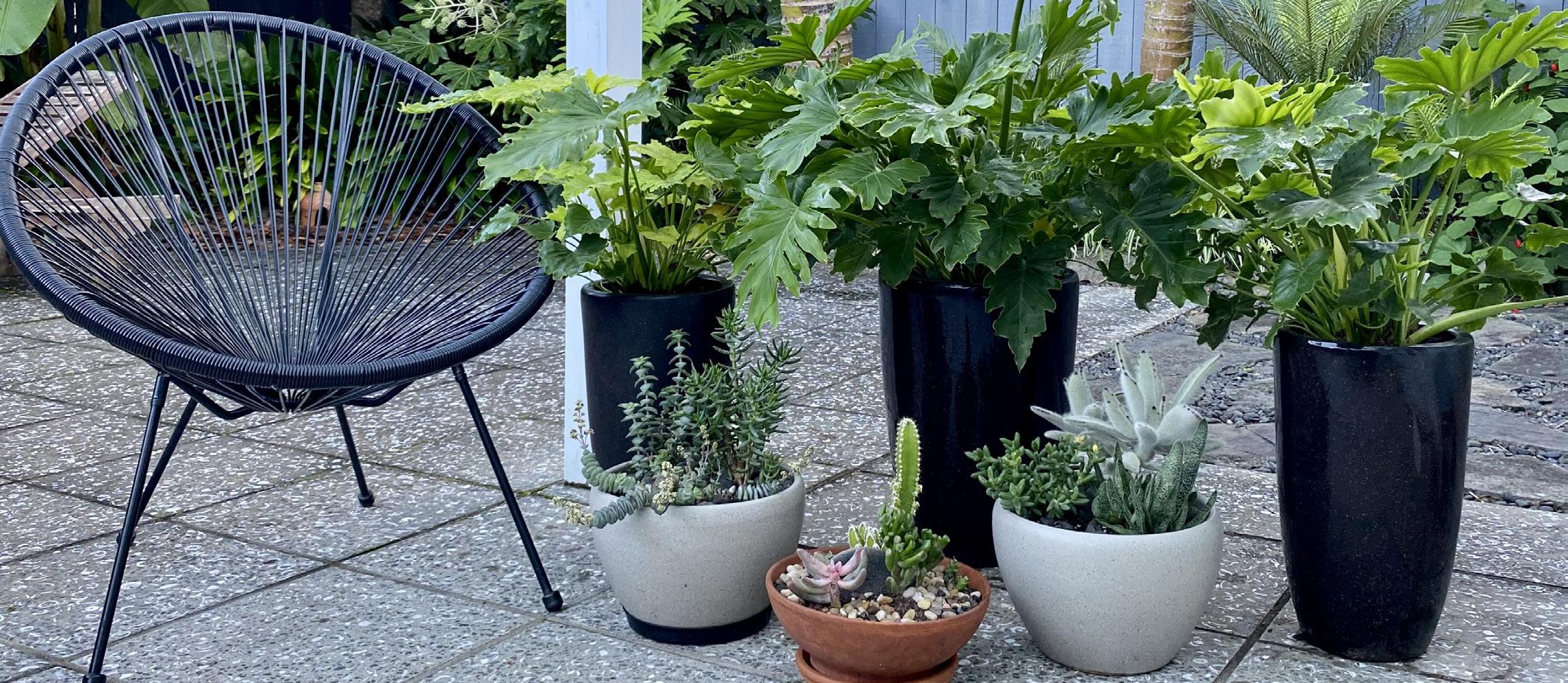
Hero Of Our Edible Garden
Back in 2018, I had never tried my hand at growing fruit and veggies. I visited my local Kings, searching for something easy to start off with, and stumbled across a beautiful banana tree. The team instore shared how easy it is to grow banana trees, especially in Auckland’s sub-tropical climate. Today, my banana tree is the hero of my edible garden, having produced many pups over the years, and many delicious harvests of bananas that I love to share with my friends and family. I now have a flourishing herb and veggie garden, as well as a number of fruit trees around my property. Thank you Kings for helping me get started on my edible garden journey.
- Helen, Auckland
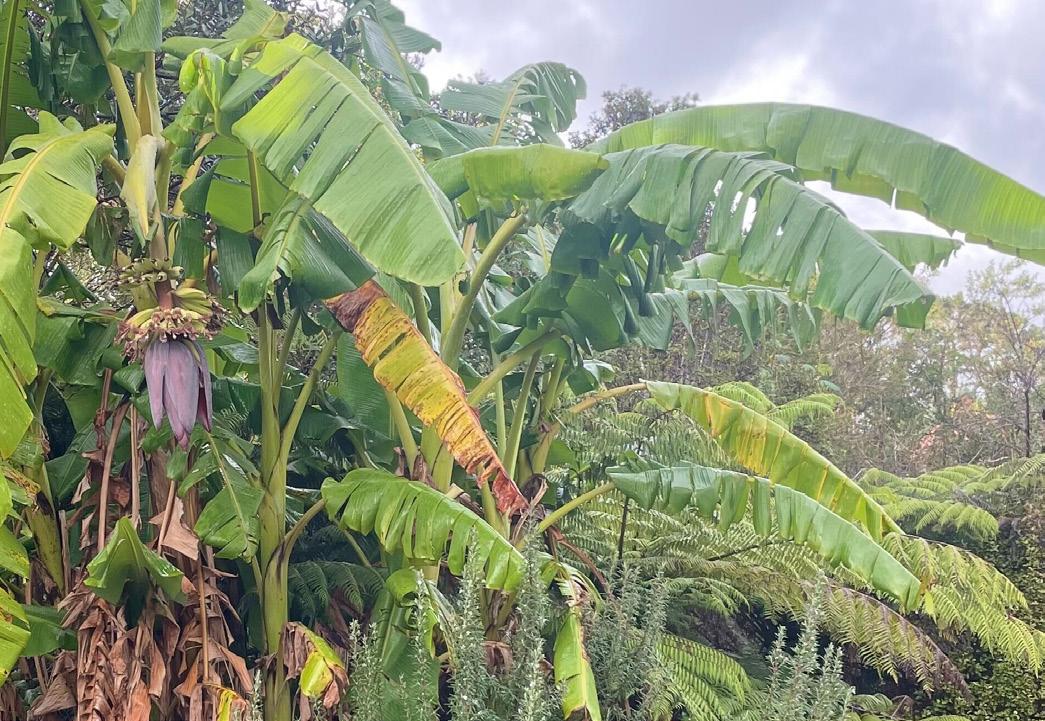
BE IN TO WIN A $50 KINGS GIFT CARD Post: PO BOX 31002, Milford, 0741 Email: scoop@kings.co.nz or message us on Facebook or Instagram SEND US YOU R STORYAND Every published story wins, so send us your gardening success stories!
- Jane, Auckland
5
ASK THE Plant Doctor
Got a tricky plant question? Ask instore or try our online Plant Doctor at plantdoctor.co.nz

PLANT D OCTOR
PLANT D OCTOR
Hi Plant Doctor,
I’ve got white goop on my pittosporum bushes. They are at the top of the plant. Any idea what it is?
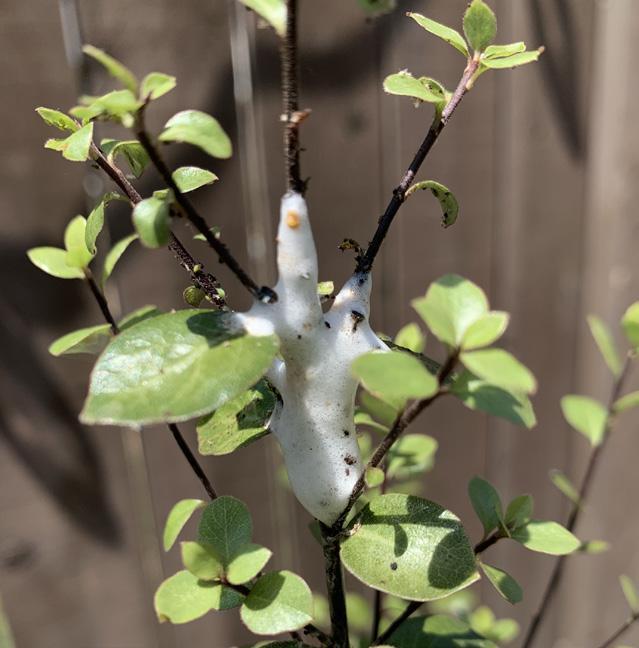
- Thanks, Mark
Hi Mark,
The goop on the plants is caused by an insect called Spittle Bug which surround themselves with literal spit. I can also see several Black Aphids on the leaves which will also need treating. I suggest spraying with Groventive Garden mixed with Bioneem.
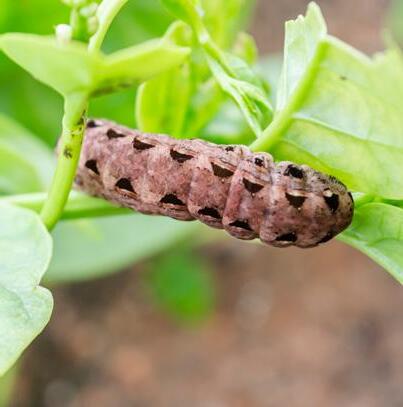
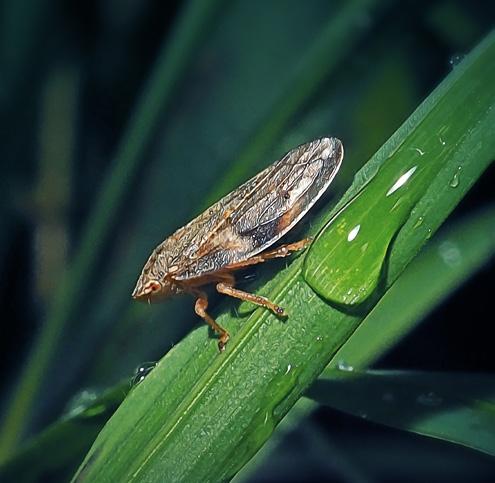
Hello Plant Doc!
Our total vege garden has been decimated by a black caterpillar and now they are into to our rhubarb. Please help.
- Thanks, Murray
Hi Murray,
The caterpillar that you have that is causing all the damage is a species of Army Worm, most likely Fall or Tropical Armyworm. Moist, humid, and warm temperatures provide favourable conditions which can lead to breakouts in high numbers. The caterpillars come out at night and munch away while we are sleeping. At first sign of attack spray with a combination of two sprays. Success Ultra and Aquaticus Bugtrol, spray with one and then spray four days later with the other. Success Ultra can only be used four times in a season so when you have used it four times change to Mavrik and Bugtrol for the best results.
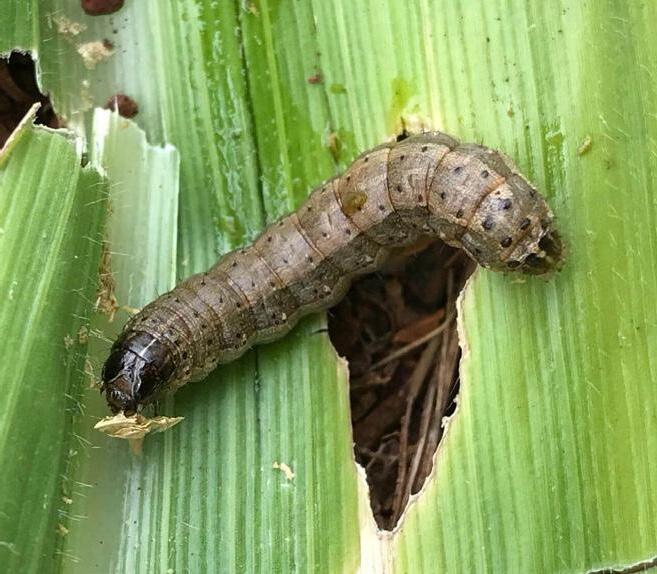
6






















































































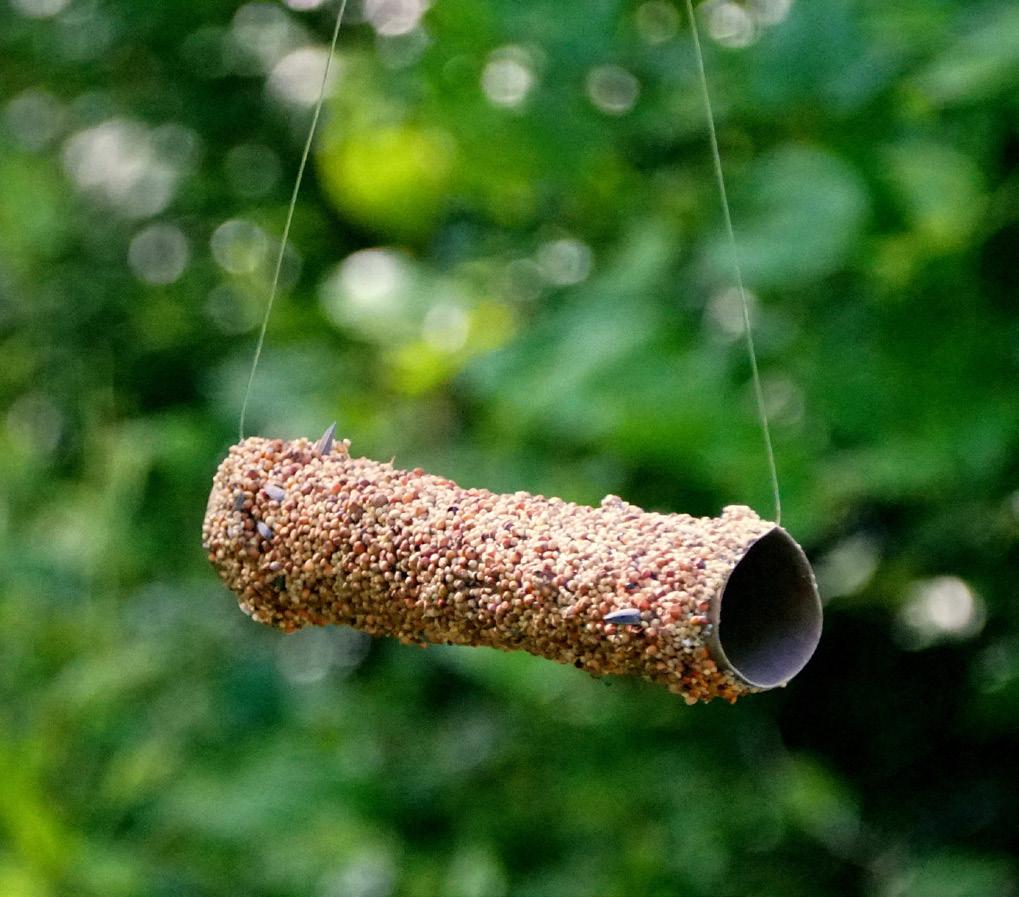
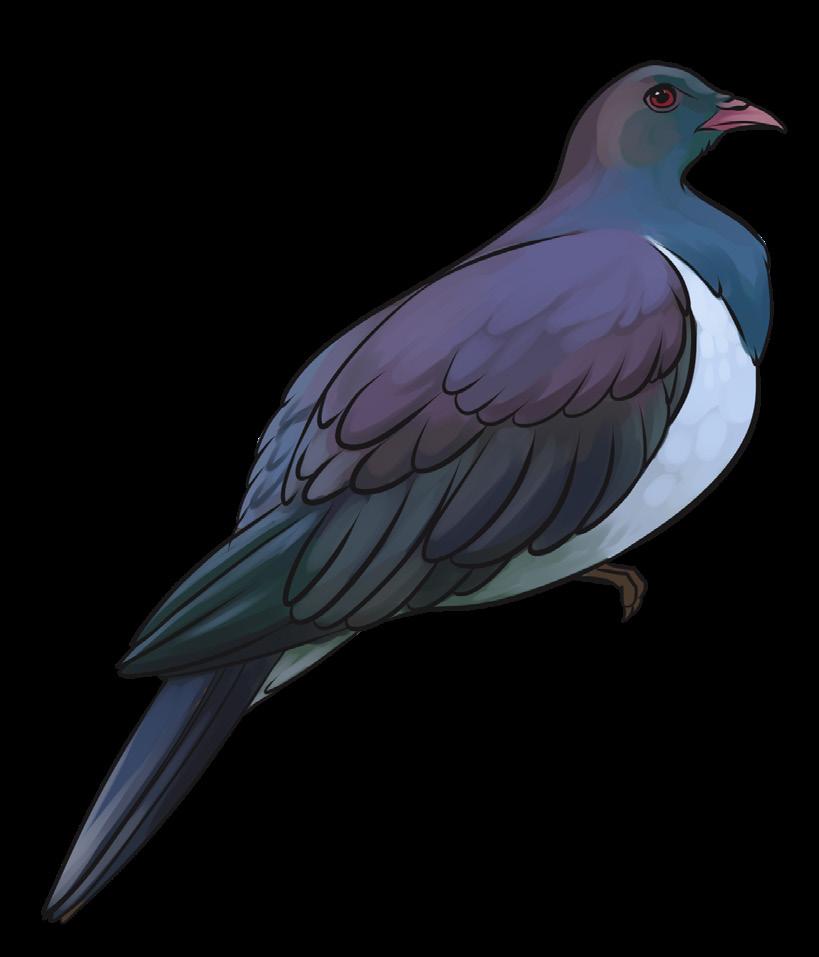
Little Growers Corner IL T T LE GRO WERS C L U B Win! Email a photo of your finished bird feeder to scoop@kings.co.nz before 1st September 2023 and go in the draw to win a $50 Little Growers prize pack!* MAKE YOUR OWN Bird Feeder *One winner will be randomly selected and notified by email by 9th September 2023. One entry per person. 7 1 Start by spreading a generous amount of peanut butter or honey on the outside of an empty toilet paper roll or paper towel roll. 2 Roll the peanut butter or honeycoated roll in bird seed, making sure to cover it evenly. 3 Thread a piece of string or ribbon through the center of the roll and tie a knot at the top. This will be used to hang the bird feeder. 4 Find a suitable location outside to hang the bird feeder, such as a tree branch or fence.
WINTER PLANTS We’re Loving
Magnolia
Blooming from late winter through spring, magnolias are a timeless classic. Their stunning blooms will bring beauty to any outdoor space. We love the versatility of magnolias, with both deciduous and evergreen varieties available in a range of sizes - there’s one to suit any garden.
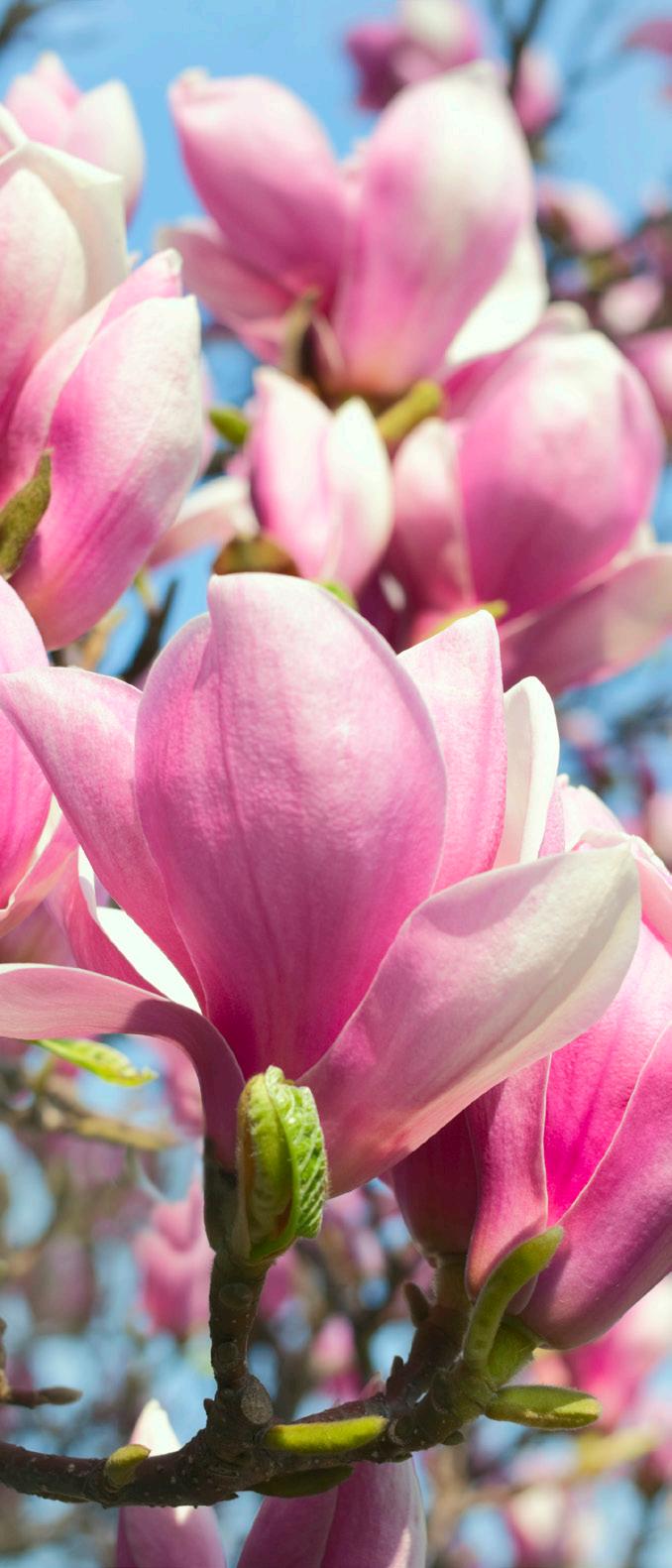
Protea
If you're looking for a unique and exotic plant to add to your garden, protea are the perfect choice. We love their striking architectural flowers in bold colours. They are ideal for a winter garden, flowering from autumn through spring. Protea are low-maintenance, droughttolerant and grow well in sunny spots.
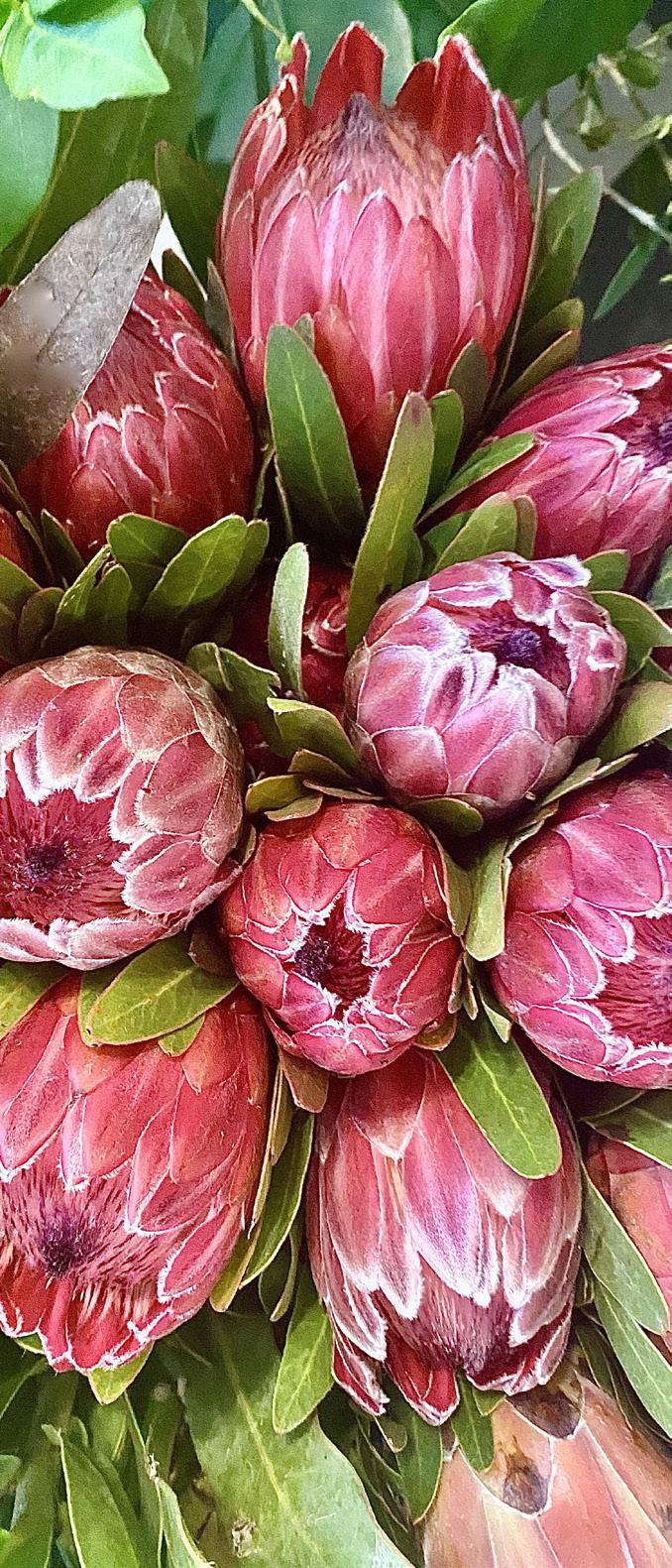
Flowering Cherries
These stunning trees are popular for their delicate pink and white blossoms that create a spectacular display in spring. They are relatively easy to care for, growing well in sunny spots and free-draining soil. Flowering cherries are versatile, working well as a feature tree, or in a mixed border.
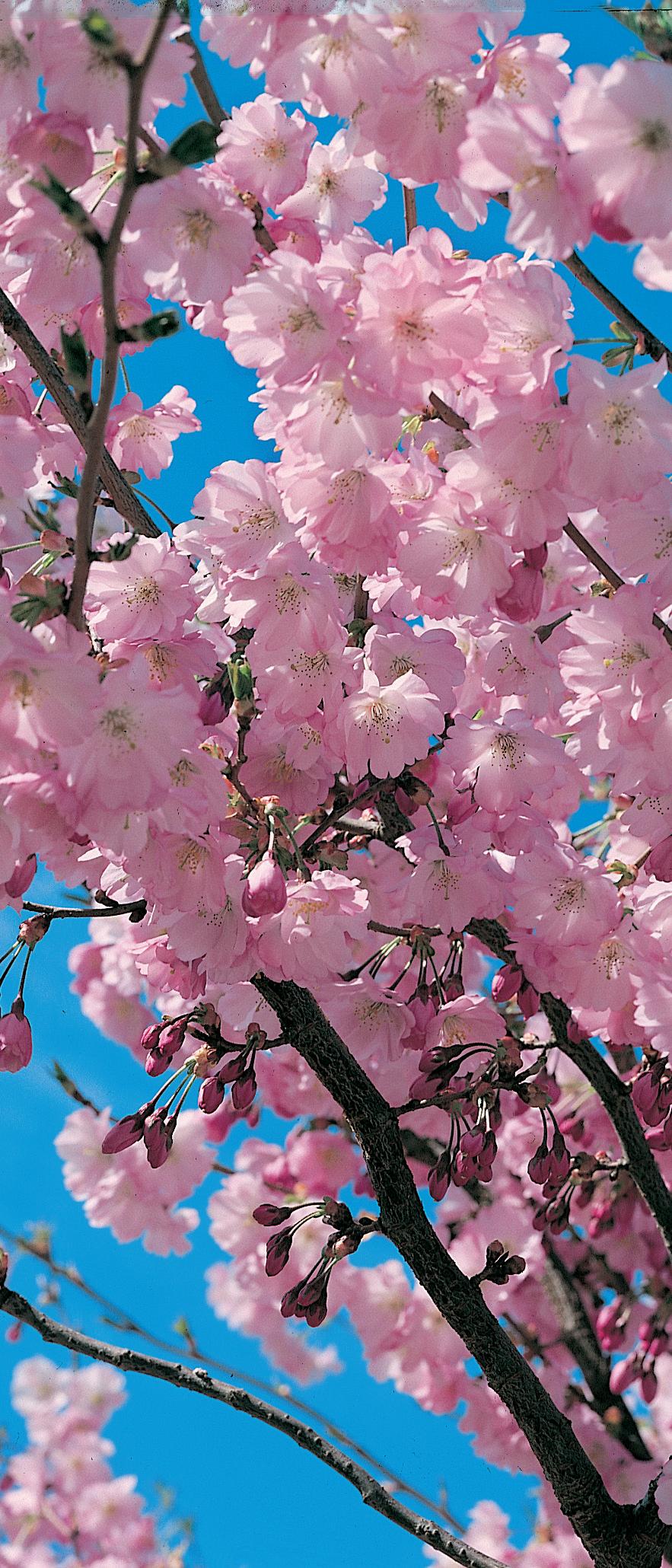
8
Winter is known for its dark and rainy days, but there are still plenty of plants that can bring your garden to life during the season. As the cool weather sets in, we have a huge range of beautiful colour available instore, perfect for brightening up a cold winter. Here are some of our favourites for the season.
Leucadendron
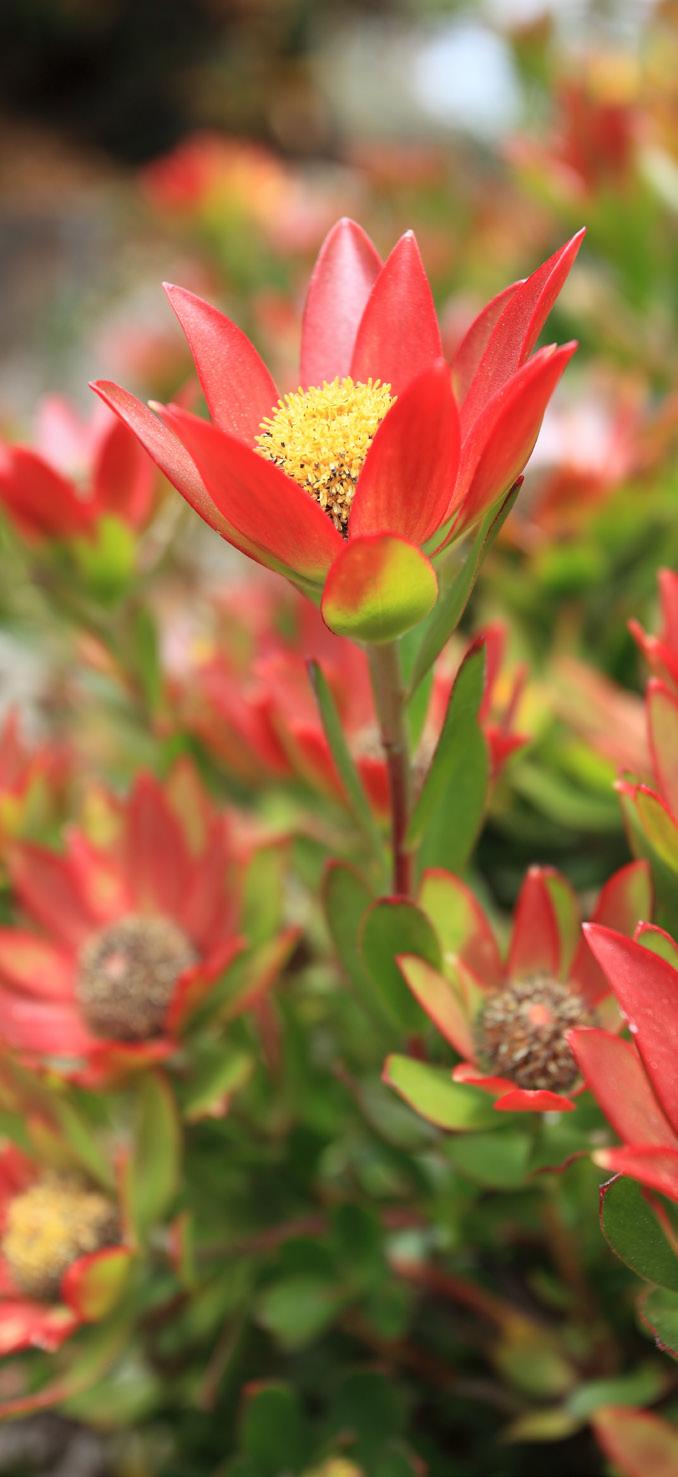
With their colourful foliage, and blooms in pinks, reds, oranges and yellow, leucadendrons will add texture and interest to your garden. They are unique and striking, but also low-maintenance. Leucadendrons show their best colour in the cooler months, making them an ideal choice for a winter garden.

Plums
Plums are a guaranteed favourite in the garden, with tasty fruit and beautiful flowers. Their delicate pink and white blooms will fill your garden with a sweet fragrance come spring. Plum trees are relatively easy to care for, growing well in a sunny position with at least six hours of sunlight each day.
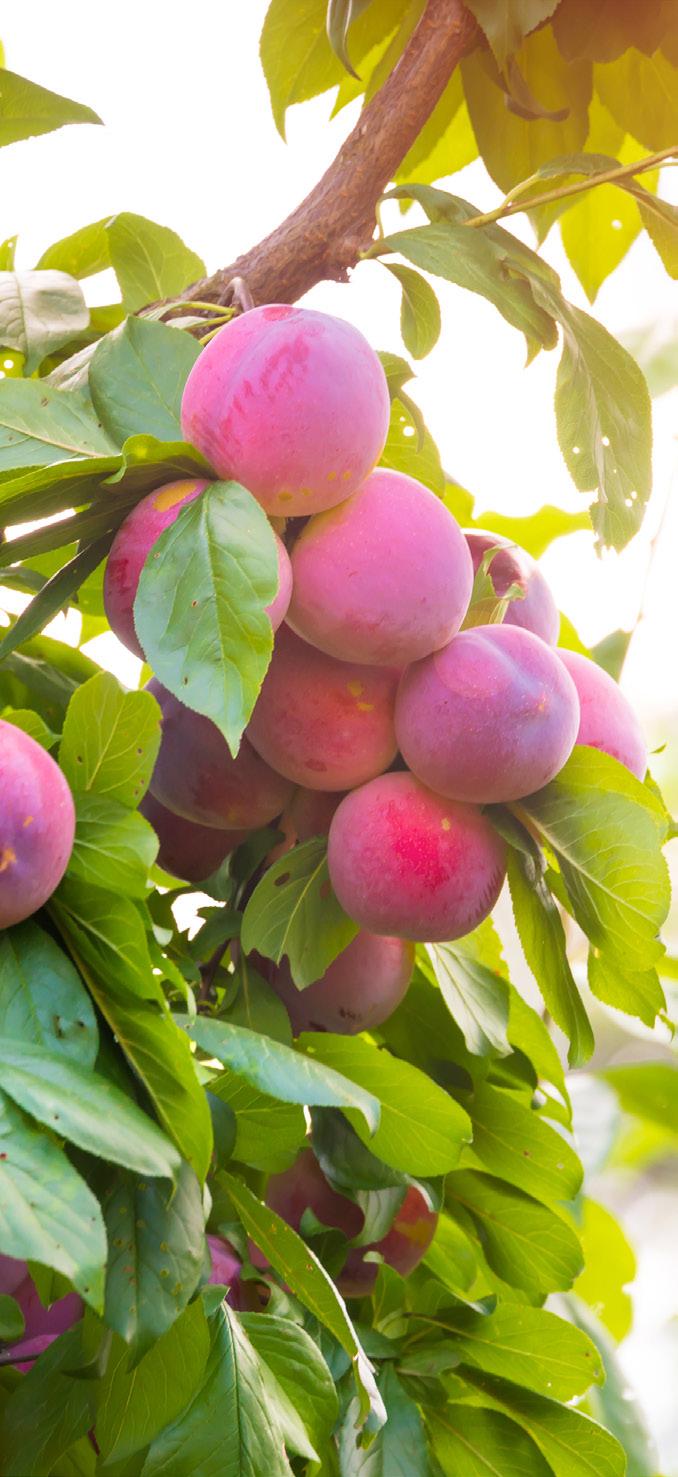
Daphne
With their captivating fragrance and stunning white blooms with pink blush, what’s not to love about daphne? Their sweet scent will fill your garden from late winter to early spring, making them one of our favourite winter shrubs. Daphne grow well in a part-shade position, with free-draining soil.
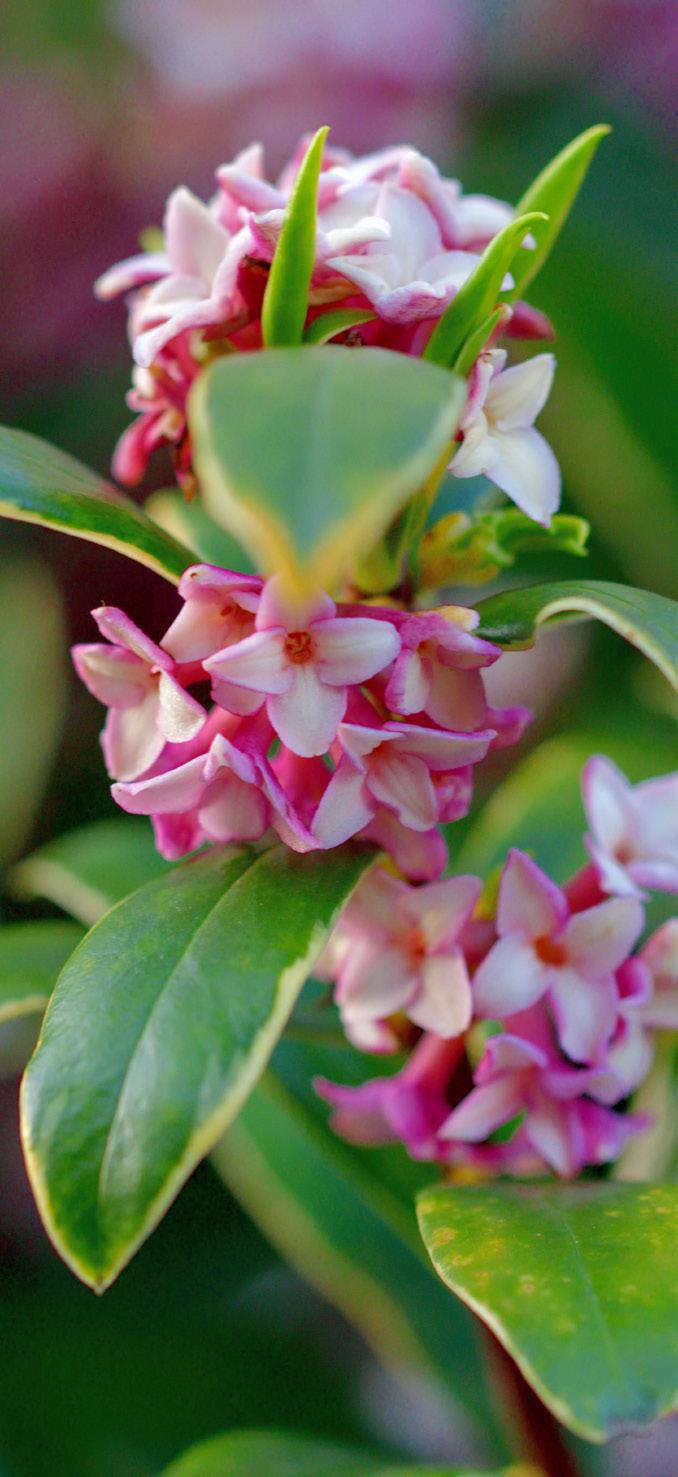
Join
KingsPlantBarn
KingsPlantBarnNZ

our Kings community to stay up to date with the latest gardening news, monthly giveaways and be the first to know about our exciting new arrivals and special offers.
9

NAVIGATING THE Cost of Eating
As the cost of living continues to rise, we’re all looking to ease the strain on our pockets. Growing your own is an easy and cost-effective way to save. Did you know that from just one punnet of spinach, you could harvest a couple of kilos per season? Starting a veggie garden is easier than you might think, and we have everything you need to get started, regardless of your garden size. Here are some tips to help you get started:
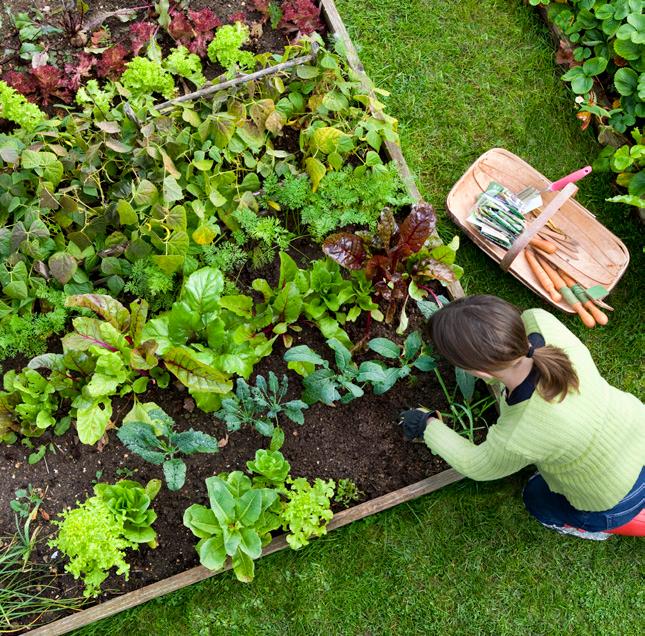
Pick Your Times
Stagger your planting to spread out your harvest. We would recommend having a two-week gap between plantings to ensure you have a constant supply of fresh veggies throughout the season.
Find The Right Spot
Your veggie garden will need at least six hours of sunlight everyday, so pick a spot that gets plenty of sun. Ensure that your bed has good drainage, so avoid places where water might pool on your property.
Choose Your Veggies
Brassicas are perfect for growing in winter as they thrive in cooler temperatures with less pests. Try growing cabbage, cauliflower, broccoli, kale and Brussels sprouts from seedling form.
Prepare The Soil
Make sure your soil is rich in nutrients by adding plenty of organic matter, such as compost and sheep pellets. Lightly fork in some Kings Blood and Bone to provide your soil with an extra boost.
Stay Mindful Of Watering
While plants may require less water during winter, dry winter air can cause the soil to dry out faster than you might expect. Aim for deep watering sessions less often rather than overlyfrequent shallow ones.
Veggie Care
Check your veggies often to make sure your plants get enough water and are free from pests and diseases. Regular weeding will also help your veggies thrive.
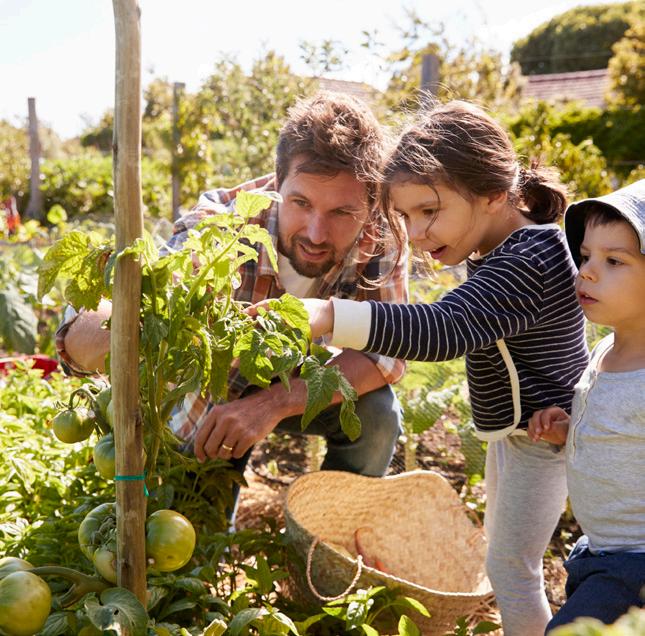
Start Seeds Indoors
Get a head start on the growing season by starting your seeds indoors. Invest in some seed trays, potting soil, and space on a sunny windowsill - use artificial grow lights if natural light is limited.
11
BEGIN YOUR JOURNEY OF Growing from Seed
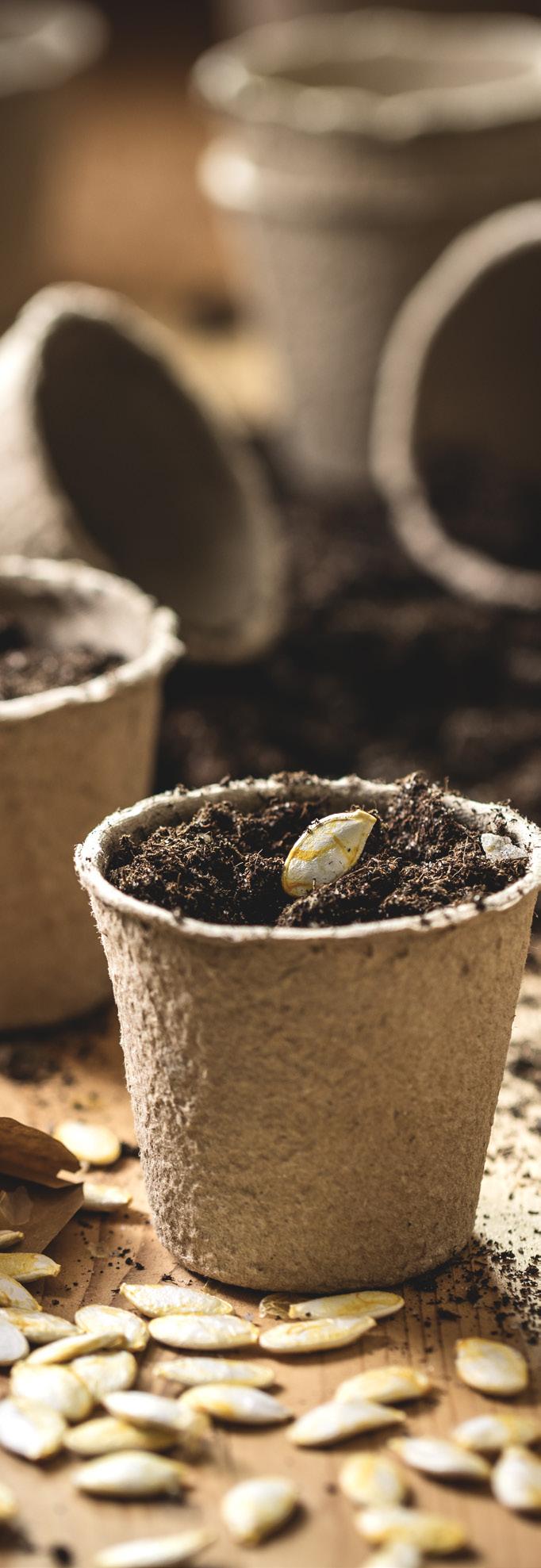
Growing from seed is such a rewarding way to garden. Watching a tiny seed transform into a thriving plant is a fulfilling experience for seasoned gardeners and beginners alike. Some of our top seeds for sowing in winter include lettuce, onions, peas, broccoli, and beetroot. Seeds can be sown all year round, so make sure you check the back of the packet for the recommended time to sow in your location.
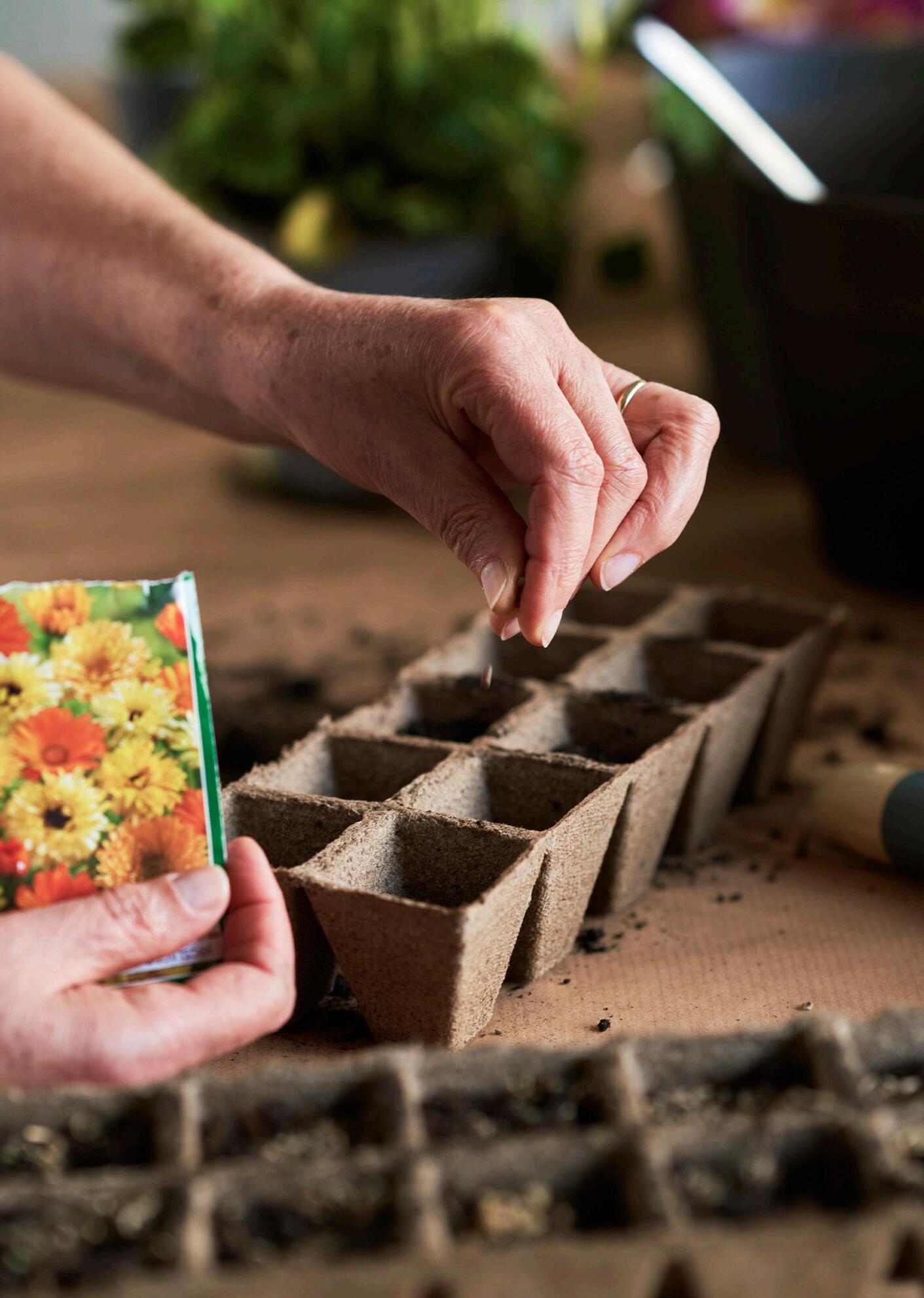
12
Sowing
Sowing in Seed Trays
To begin, fill your seed tray with a seed-raising mix and moisten with water using a mister. Follow the instructions on your seed packet for specific planting requirements. Once planted, lightly cover the seeds with a thin layer of mix, and press down gently to ensure good contact between the seed and the soil. Position the tray in a warm, well-lit position, away from any low night temperatures. If you’re growing outside, make sure it is in a sheltered and sunny position.
Care
Watering
Sowing in the Ground
If you’re sowing your seeds directly into the ground, prepare your garden beds by mixing in Kings Garden Mix, and then raking to form a fine seedbed. Plant the seeds according to the instructions on the back of the packet, and then rake over them gently with the remaining soil. Water in lightly once planted. Some seeds, like beans and peas, grow well up a trellis.
Water your seeds regularly, ensuring the soil does not dry out. If you’re growing in a seed tray, use a hand sprayer to moisten the mix by misting the seedlings. If growing in the garden, use a hose on a sprinkle setting, reducing the water pressure and ensuring the nozzle is facing upwards. Water gently, as too much heavy watering can disrupt the roots of germinating seeds and seedlings.
Transplanting
Once your seedlings have at least two pairs of true leaves, you can start transplanting them into the ground. Lift them by their leaves to avoid damaging the stem and root system. Gently tease apart the seedlings, and plant them individually into prepared holes, slightly deeper than the level they’ve been grown in. Press the soil around the plant, and water carefully.
Feeding
Once your seedlings have been transplanted, you can begin fertilising. Use Kings Liquid Fast Food Fertiliser, or Aquaticus Organic Garden Booster at half strength for young plants.

Expert Tip
As your seeds grow, gradually increase the amount of time they spend outside, slowly introducing them to a different climate in a process known as 'hardening off'. But be mindful of frosts!
13
BRIGHTEN UP YOUR GARDEN WITH Winter Colour
Keeping your garden beautiful during winter may seem like a daunting task, but with a little creativity and the right plants, you can keep your outdoor space looking colourful all year round.
Adding a pop of colour to your winter garden is the easiest way to brighten up those dreary, cold days. From the enchanting fragrance of boronia with delicate bell-shaped blooms to the eye-catching nandina which changes colour as the temperature drops, there are so many options to suit any garden. Whether planted directly into your garden beds, or into pots on the deck, these winter favourites will create a beautiful display in your outdoor space, filling it with colour, structure and sweet fragrance.

14
Brown Boronia
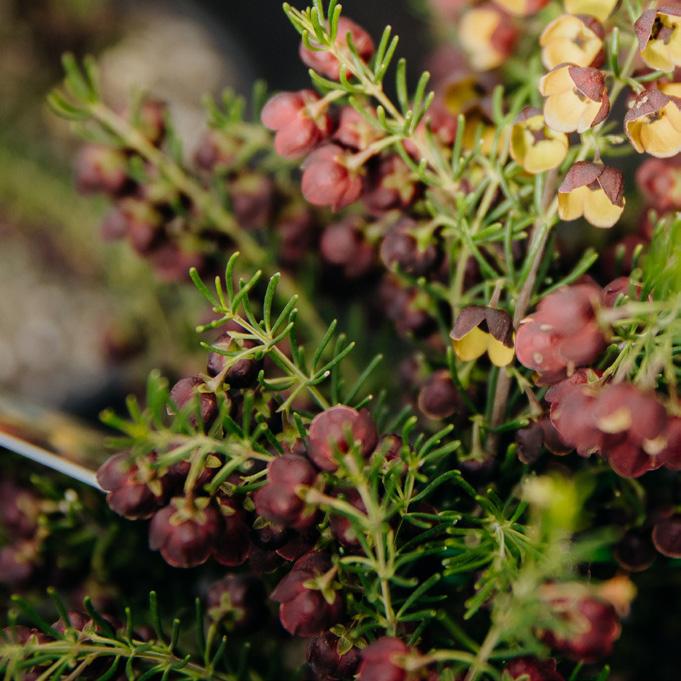
Instore in August, brown boronias are small evergreen shrubs that flower from winter through spring. Their bellshaped blooms will fill your garden with delightful fragrance.
Heuchera
Also known as ‘coral bells’, these evergreen perennials have vibrant leaves in a range of stunning colours. Their nickname comes from their small, sweet flowers hung like bells on each flower stalk.
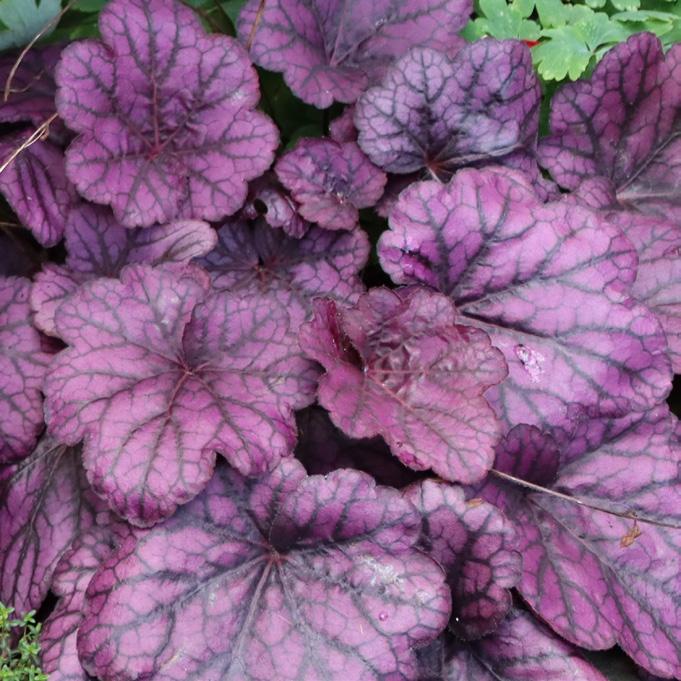
Nandina
Often known as ‘heavenly bamboo’, nandina are evergreen shrubs with striking, colourful foliage. As the temperature cools, many varieties, such as ‘firepower’, darken in colour to a deep red.
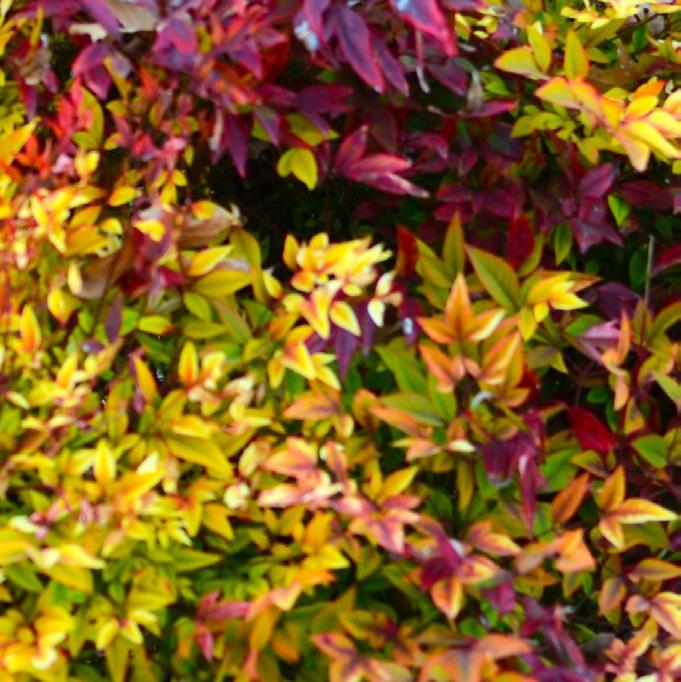
Hellebores
Nicknamed ‘winter roses’, hellebores provide a stunning display of flowers in a shaded winter garden and make a great food source for bees during the colder months. They look spectacular when planted under deciduous trees.
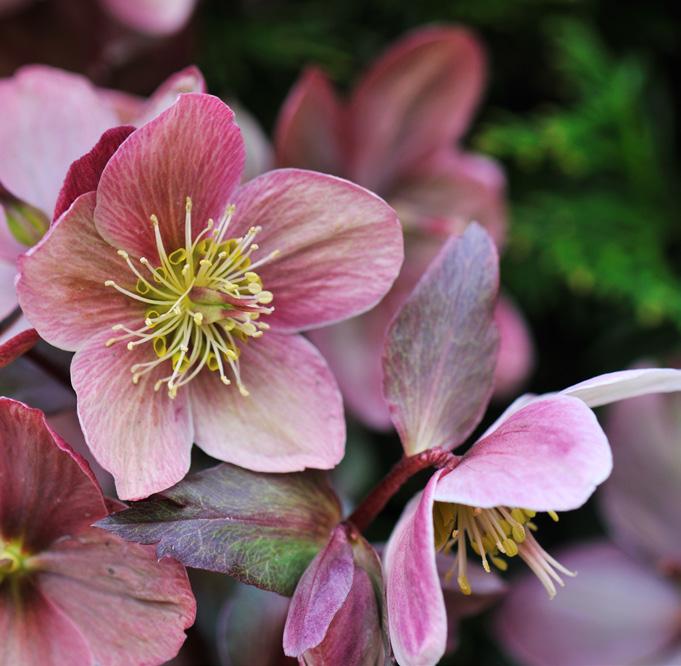
Cyclamen
Perfect for a beginner gardener, cyclamen are easy to care for and grow well in shaded areas of the garden or home. When the temperature drops, the cyclamen are triggered to bloom, filling your garden with stunning red, white, pink, and purple blooms.
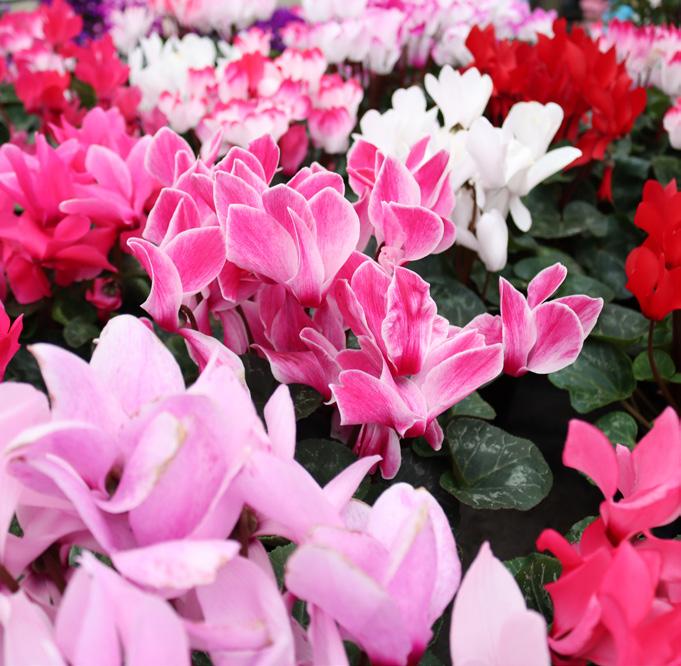
Viburnum Eve Price
With thick foliage and white and off-pink flowers, viburnum Eve Price makes a gorgeous addition to your winter garden. Instore from June, these evergreen shrubs will fill your outdoor space with their sweet perfume.
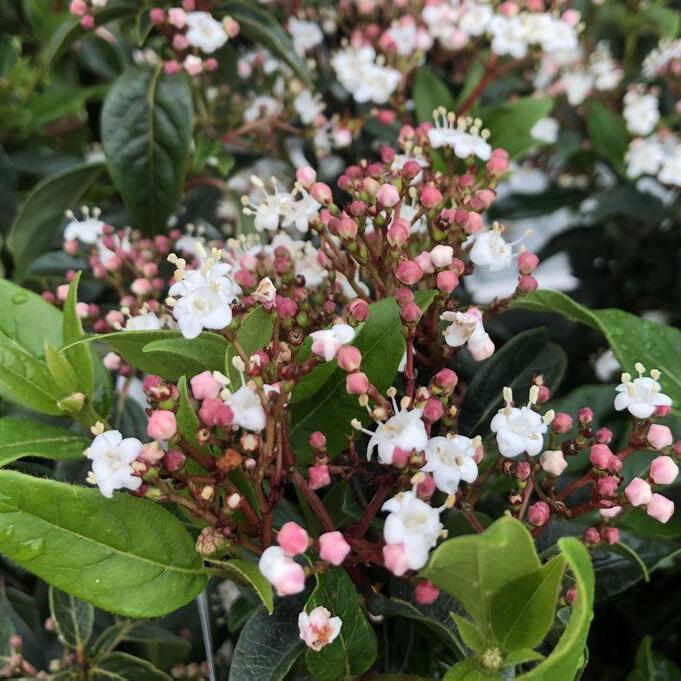
Kings Fruit And Flower Booster
Sulphate of Potash gives your plants the boost of potassium they need to produce new flowers with stronger colour and fragrance.
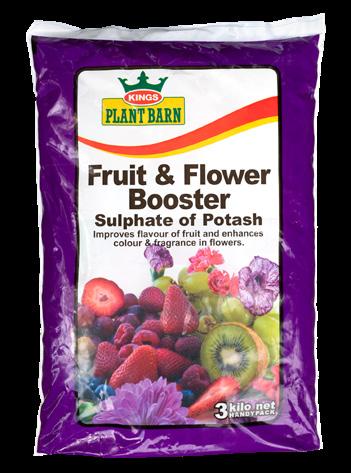
Kings Garden Mix
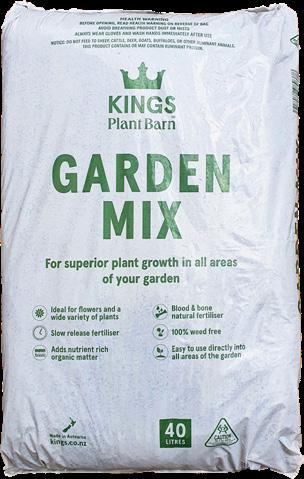
Ideal for flowers and a wide variety of plants. 100% weed-free, and includes blood & bone and slow-release fertiliser to encourage healthy, sustained growth.
Kings Sheep Pellets
A great organic fertiliser for all of your plants, trees and shrubs. Apply a handful into your dug hole, or sprinkle around drip-lines.
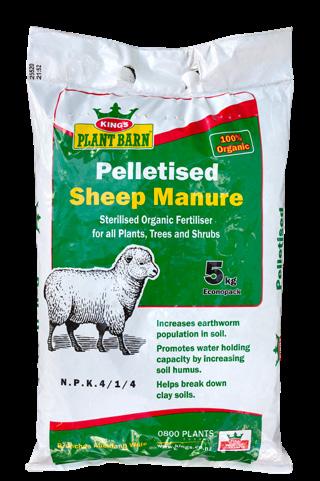
15
ROSE TIPS FOR Beautiful Blooms
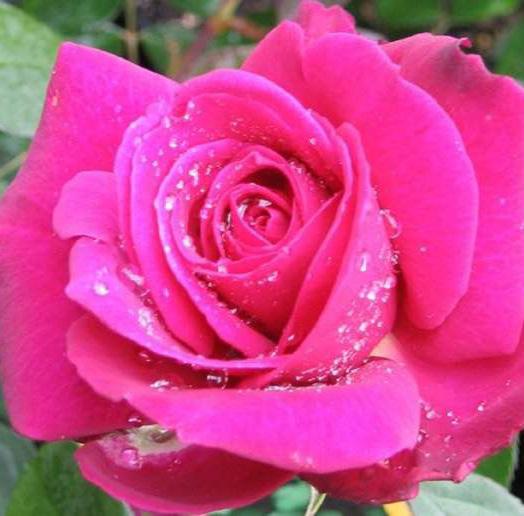
Growing roses is easier than you think, and with a little TLC, your garden will be filled with beautiful blooms season after season.
Iceberg
With clusters of pure white blooms that just keep on flowering, Iceberg is a strong grower and is disease resistant. An absolute classic and a New Zealand best seller as a standard rose.
A popular David Austin rose, Gertrude Jeckyll is known for its rich, pink blooms. With a delightful fragrance and vigorous, shrubby growth, this rose is one of our favourites.
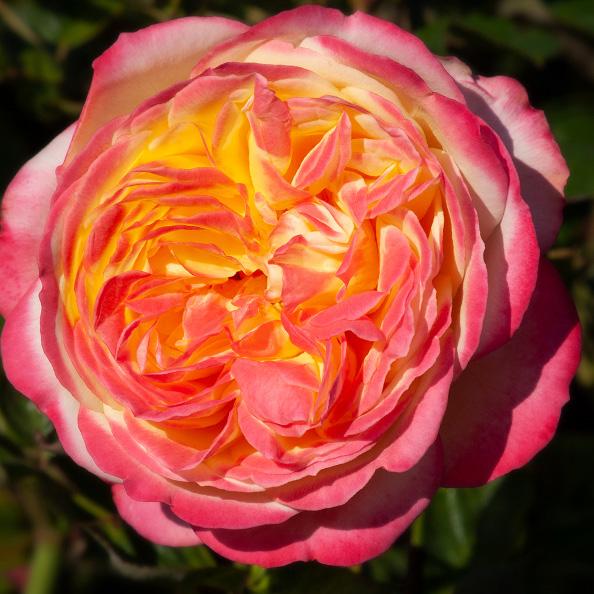
A beautiful white petaled rose, accompanied by a blush pink sheen and a strong, sweet fragrance. This rose has a small compact growth habit, perfect for smaller gardens.
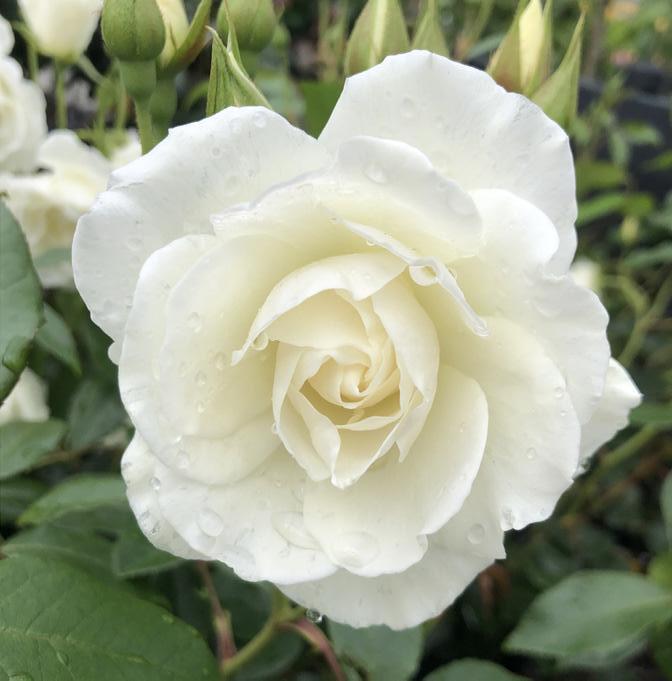
With large vanilla cream blooms that become edged in pink with age, Piece of Cake is a must-have for any rose lover. Perfect for picking with its strong and tall growth habit.
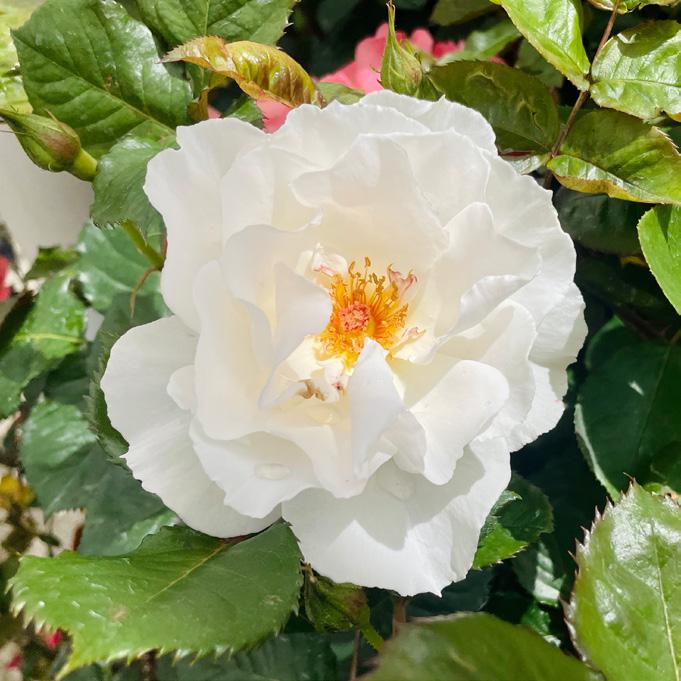
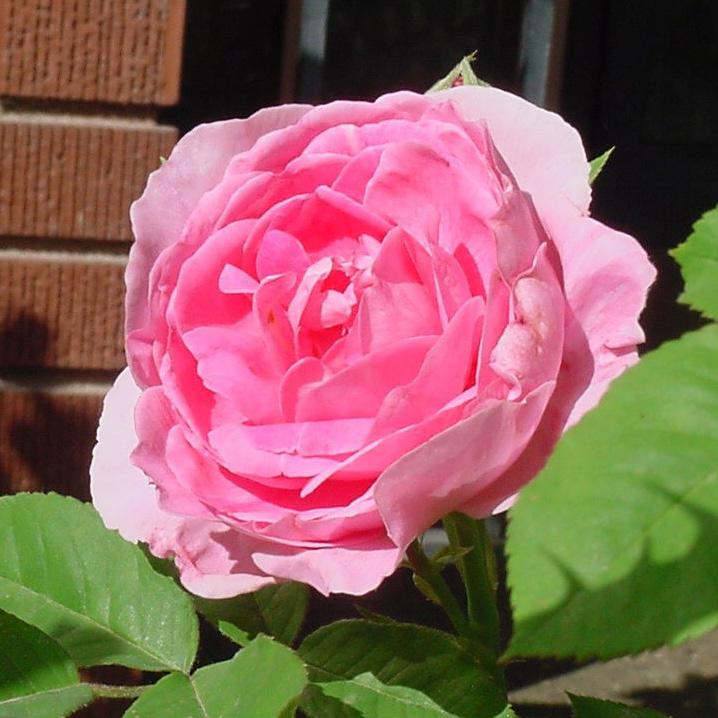
With its spectacular lime green flowers, this rose variety is truly something special. The stunning colour intensifies with age.
Named after the liqueur and bred in New Zealand, Blackberry Nip has gorgeous deep purple, seductively scented blooms, with gorgeous, healthy, and disease-resistant foliage.
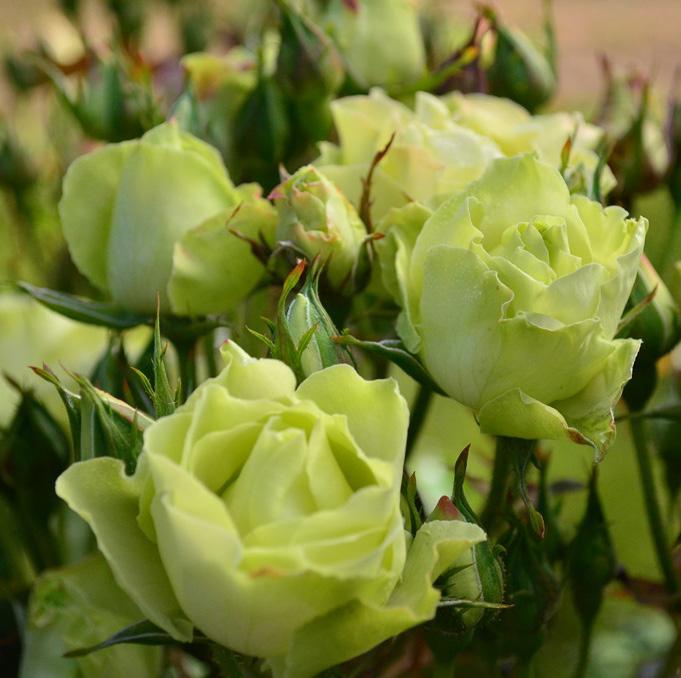 Piece of Cake
Gertrude Jeckyll
Green with Envy
Margaret Merrill
Blackberry Nip
Piece of Cake
Gertrude Jeckyll
Green with Envy
Margaret Merrill
Blackberry Nip
16
Planting
Position
Finding the perfect spot for your rose is the first step towards success. Roses grow well in full sun, and free-draining soil that is rich in organic matter. If you’re in Auckland, make sure to choose a spot with good airflow to reduce the risk of fungal diseases.
Get your roses off to the best start with these steps:
Dig a hole at least twice the depth and width of the pot the rose came in. In heavier clay soils, dig a slightly bigger hole.
Leaving enough room for your plant, backfill the hole with a mix of your original soil, Kings Compost, and Kings Sheep Pellets, or use Kings Garden Mix. In heavier soils, break up the edges of the hole as you backfill to improve drainage and add a handful of ClayBreaker Gypsum.
Place your rose into the hole and backfill the rest with your mix and some of the remaining topsoil, making sure you press the soil down until it is firm. In heavier clay soils where drainage is likely to be an issue, plant into a slight mound. You can also add some pumice sand to your mix for even better drainage.
Mulch to finish, keeping it a few centimetres away from the trunk.
Once your rose starts to bloom in spring, here are some tips to keep you growing well:

Feed with a generous handful of Kings Sheep Pellets and Kings Slow Release Rose Food.
For an organic option, fertilise with Kings Sheep Pellets and Aquaticus Organic Garden Booster.
Regular deep watering in the drier months will keep your roses looking beautiful through summer. Leaving the hose on for 5 minutes once or twice a week to slowly and deeply water your roses is more effective than giving them a slight water every day. Try to avoid wetting the foliage and stem if you can.
Mulching suppresses the weeds and helps the soil to retain moisture.
Deadhead by cutting back to a 5 leaflet leaf set, where the stem is strong enough to support the next shoot. This will keep your rose looking tidy and ensure it flowers well in the future.
17
Pruning
Already have a rose in the ground? Late July is traditionally the best time to prune roses as it is the coldest time of the year, meaning the plant is in a dormant state. Before you start, make sure you have the right equipment, including sharp secateurs, sturdy gloves, a pruning saw, Yates Lime Sulfur (for the post-pruning clean-up spray), and pruning paste.
Here’s how to make the perfect cut:
Cut back to a bud at a 45-degree angle.
Seal cuts larger than 15mm with pruning paste.
Check for suckers at the base of the plant, usually below the graft point, and remove any unwanted ones. The graft point is usually evident as a slightly crooked or dog-legged bump a few centimetres above ground level.
For bush and standard roses, aim to create an open vase shape by removing dead, damaged or diseased shoots, thin twigs, and crossing branches. Shorten the remaining branches by at least one-third, trimming back to an outwardfacing bud.
For climbers, remove thin twigs, crossing branches, and open the rose up to increase airflow, then trim back by up to a third.
Grow well with these
ROSE ESSENTIALS
Fiskars Secateurs
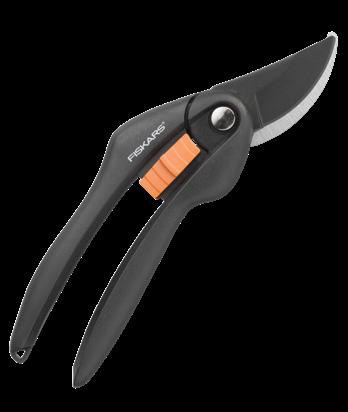
A clean, sharp cut when pruning is extremely beneficial to the health and well-being of your roses.
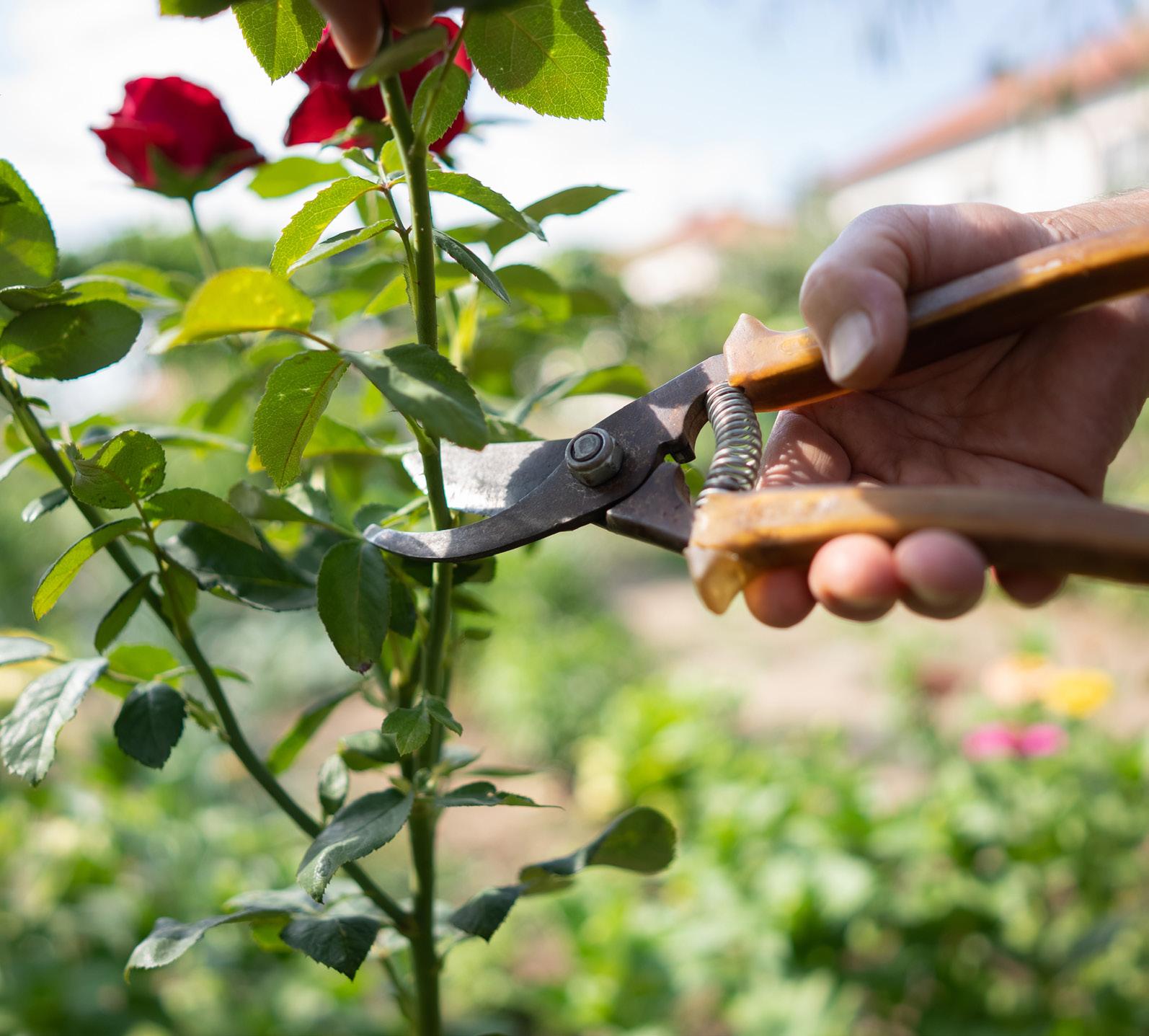
Expert Tip
After pruning, remember to clean your tools with a disinfectant. This helps prevent diseases from spreading between plants and keeps your garden in tip-top health.
Kings Rose Food
Use our fantastic fertiliser when planting your roses to help promote lush growth and stunning blooms.
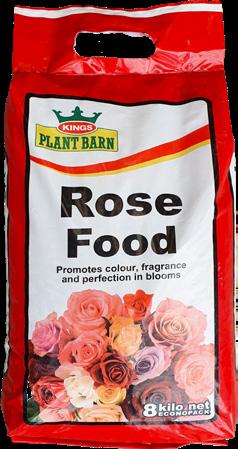
Kings Compost
Mix into your original garden soil for organic nutrients, as well as helping to improve drainage.

18

KEEP WINTER BRIGHT WITH Interior Delights
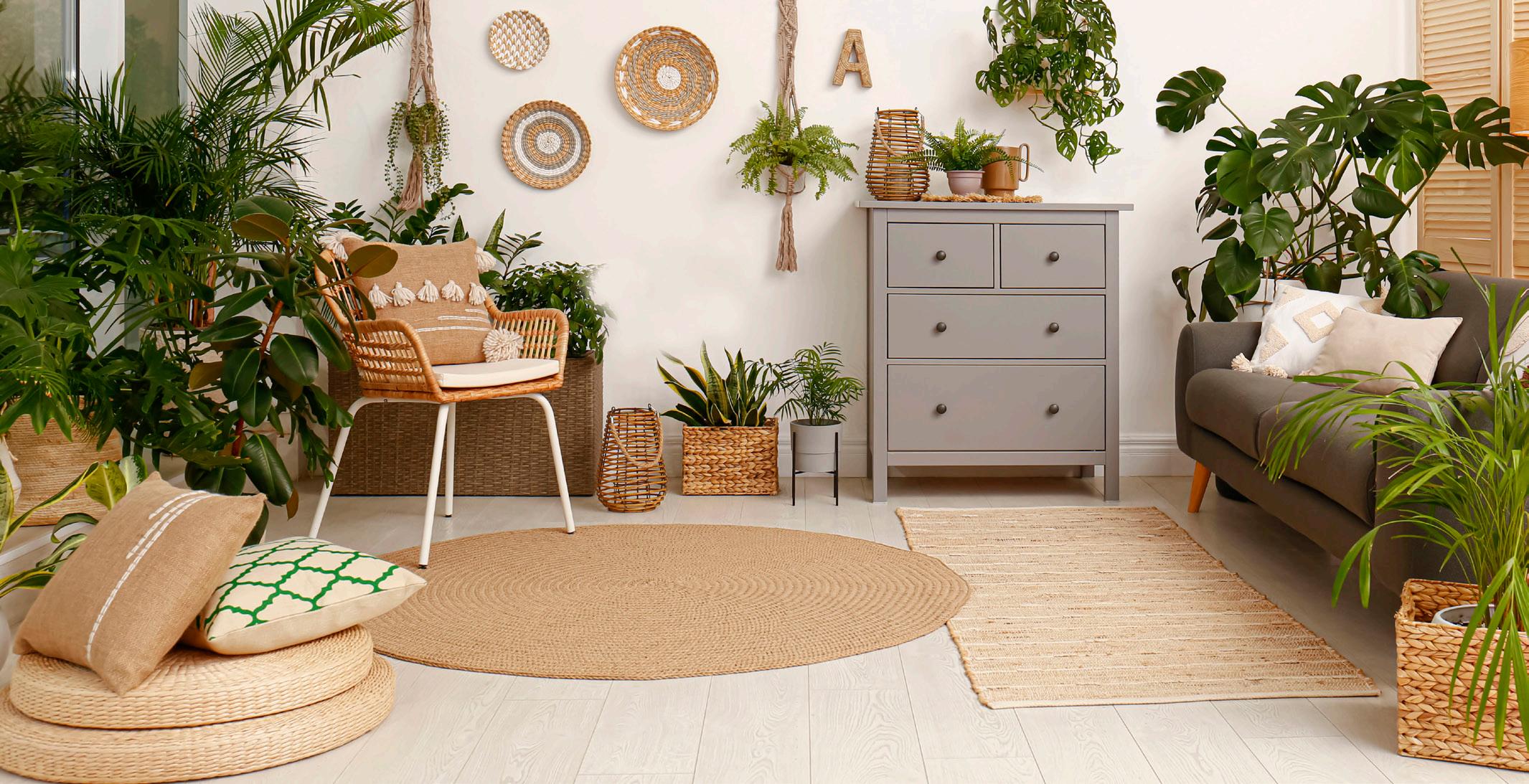
As the cool, dark days of winter set in, it’s important to adjust your indoor plant care routine. Here are some tips to keep your houseplant collection growing well through the winter season.

20
Grow Well Tips
Temperature
Most indoor plants are tropical or subtropical, which means that they need to be kept warm through the cold winter months. Keep your plants in a room that is 18°C or warmer, otherwise, your plants may show signs of cold damage on their leaves and start dying back. Ensure your plants are kept away from cool draughts, heat pumps and heaters.


Light
With the shorter days and lower light levels in winter, your plants may need to be moved to get more light, but be sure to keep them out of direct sunlight. Clean your windows to allow more natural light in, and wipe your plants’ leaves with a damp towel to clean off any dust and help them absorb more light. For smaller cuttings and younger plants, consider investing in a grow light.
Watering
Correct watering during winter is crucial, as overwatering can lead to root rot. Cut watering back to a third of what your plants get in summer. Carnivorous plants and ferns are the only exception to this rule and need consistent watering maintained year-round.
Design Tips
Utilising Shelves
Shelves are a great way to display your indoor plants and create a beautiful indoor oasis. Adding a range of different sizes and varieties of plants to your shelves will bring some visual interest to your space. Trailing plants are ideal for those higher levels on your shelf, to soften the space and give it an authentically designed feel.
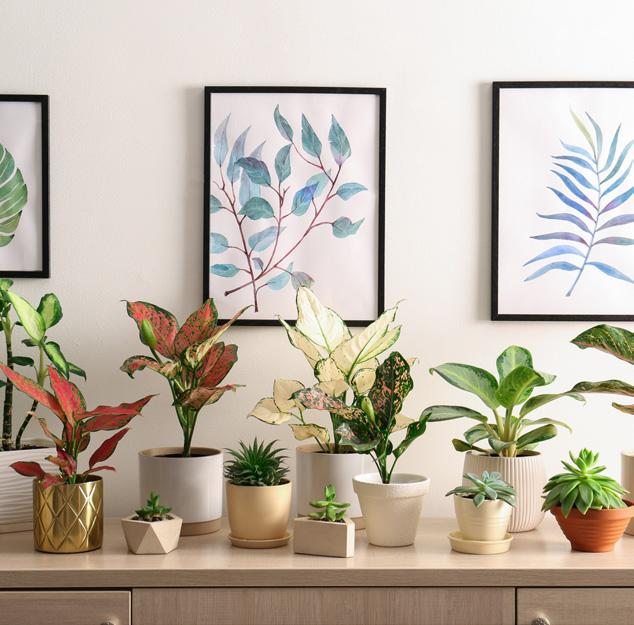
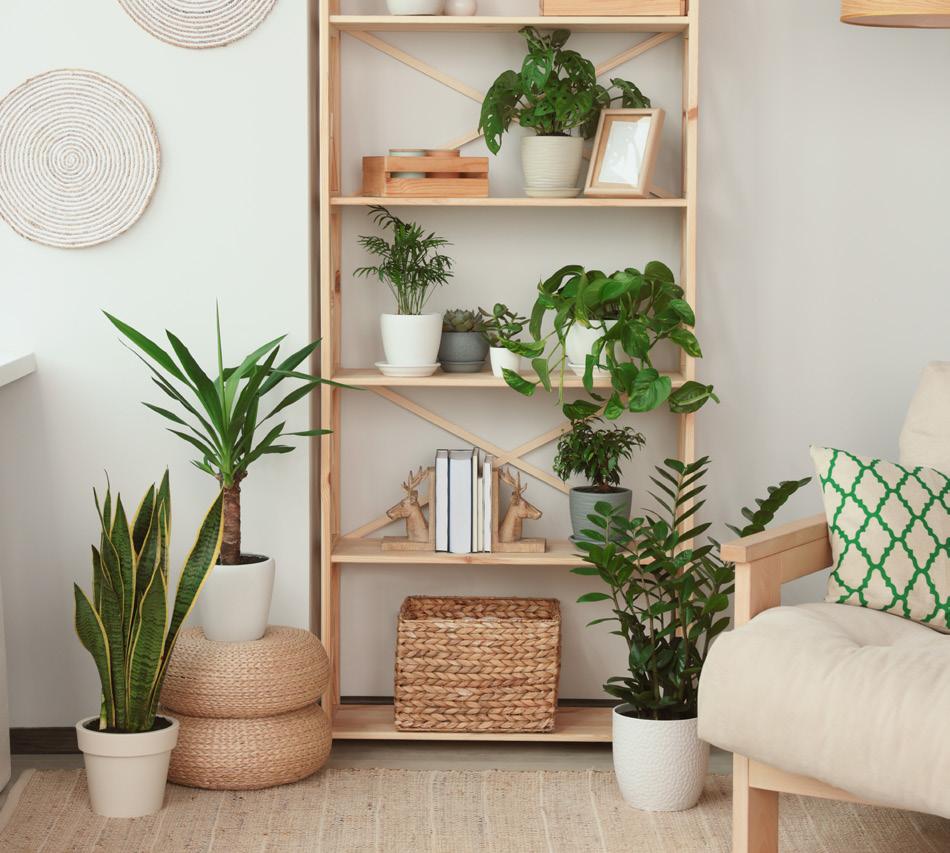
Cover Pots
Add colour and character with cover pots. This is an easy styling tool that can be changed to fit your desired look. They can be used to complement your plants or to create a striking contrast. Switching up your cover
pots every so often will keep your display looking fresh and interesting. We’re loving the deep greens, teal blues and textured neutrals for this season.
Incorporating Height
If you’re short on space but still want to incorporate more plants into your home, adding height is a simple solution. Plant stands are a great option for integrating height without taking up too much floor space, and can be used to frame larger pieces of furniture. If you prefer something with unique style, macrame hangers are an excellent choice.

21
A BEGINNER'S GUIDE TO
Deciduous Fruit
Add a touch of sweetness to your garden with deciduous fruit trees. From juicy nectarines to sweet pears and plums, there's a fruit tree to suit any garden. Arriving instore from early June to July, deciduous fruit trees are best planted in winter, so they can get settled and prepare for their spring growth.
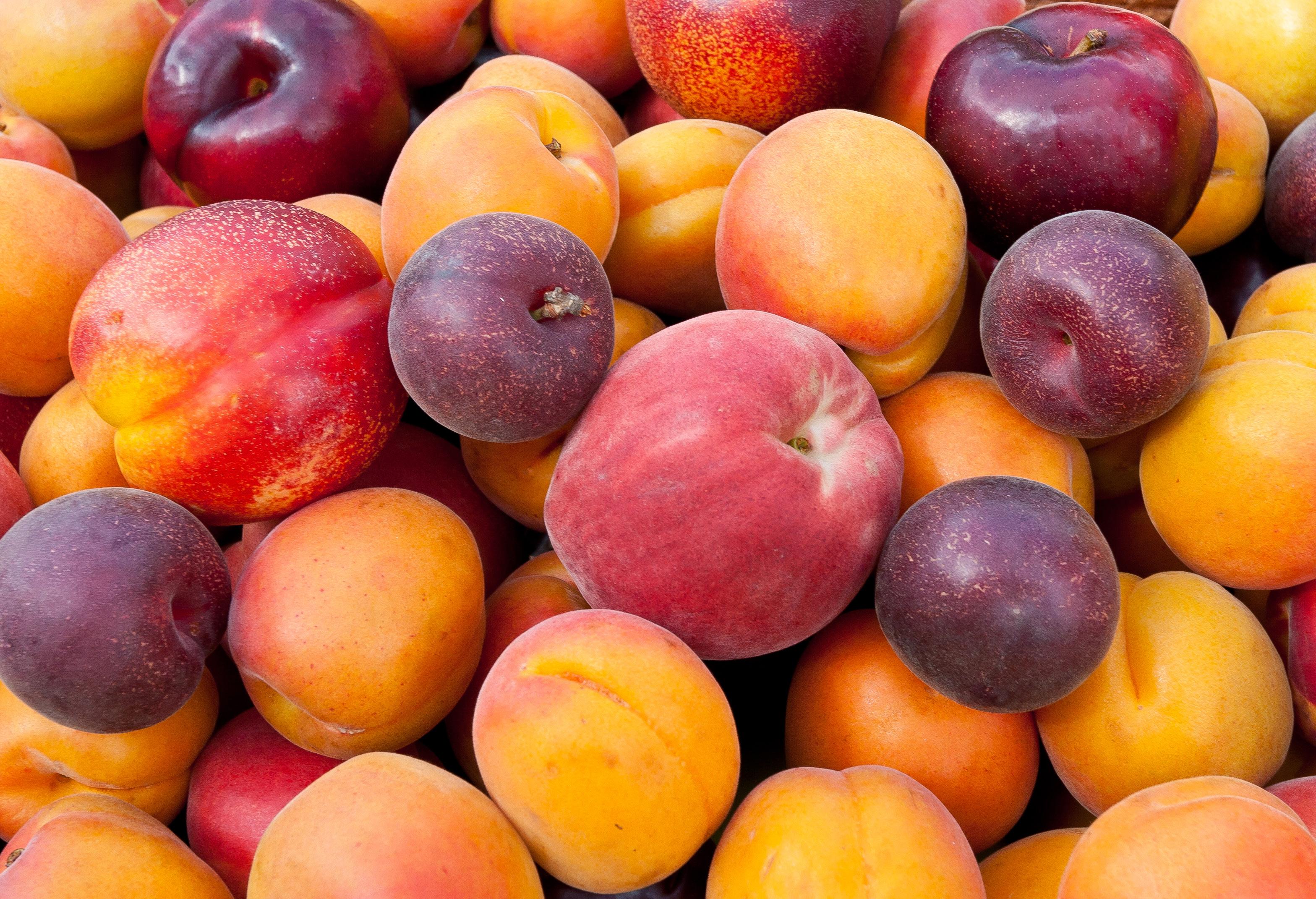
Planting Tips
The best time to plant deciduous fruit trees is in winter when they're in a dormant state, having shed their leaves for the season. Choose a sunny spot that enjoys at least six hours of sunlight each day, with soil that is freedraining and rich in organic matter.
When planting directly into the ground, mix your existing soil with Kings Compost at a 50:50 ratio. Add in Kings Sheep Pellets, Kings Citrus
& Fruit Tree Fertiliser and SaturAid, mixing thoroughly. Water in well using Aquaticus Organic Garden Booster.
For heavier clay soils, sprinkle Gypsum ClayBreaker at the bottom of the planting hole to condition the soil.
If you would prefer to plant into a container, try Kings Container Mix. It contains a wetting agent which helps maintain even moisture levels in the soil.
To support the growth of your tree, insert a hardwood stake on either sidejust be careful not to damage the roots. Secure the tree to the stakes with jute tie to keep it stable and growing well.
22
Our Top Varieties
The great thing about deciduous fruit trees is that you can never have too many. There are so many varieties that all have their own strengths, flavours, and secret culinary purposes. Here's a few of our favourites that are popping up in stores this season.
Nectarines
Snow Queen
This early-harvest variety provides sweet fruit that tastes best when eaten straight off the tree. It is a favourite amongst all who grow it.
Flavourzee (Dwarf)
The best option for smaller gardens or large containers, these nectarines are very easy to maintain and have a compact growth habit, without sacrificing quality fruit.

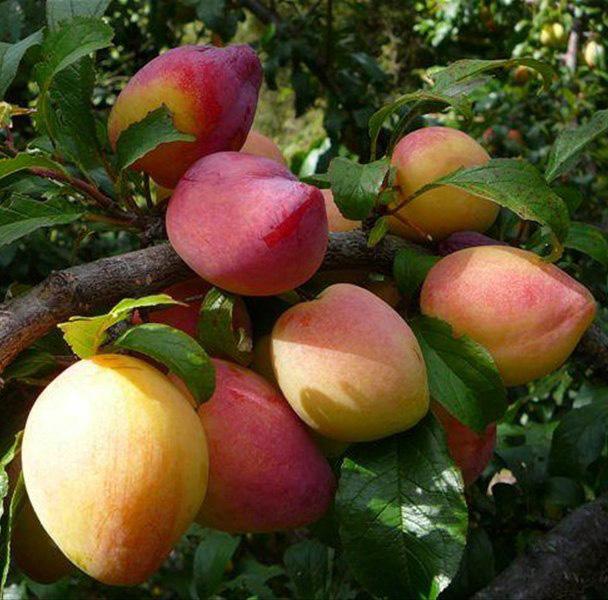
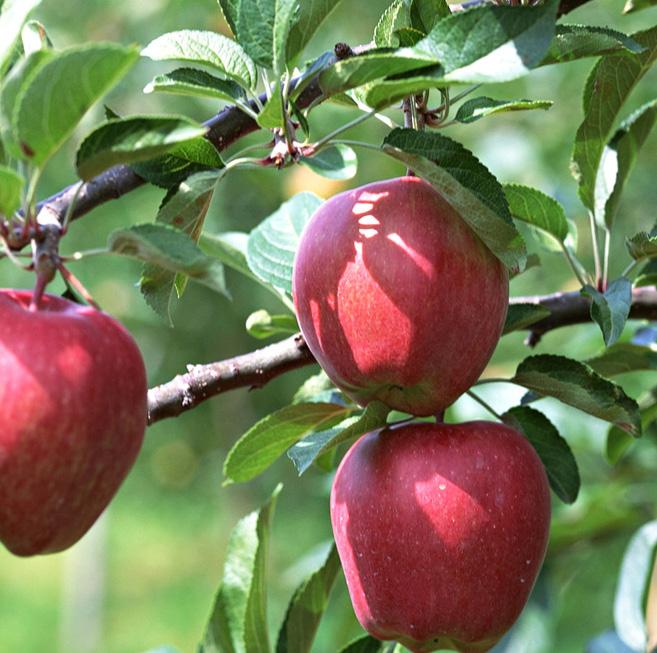

Pears
Taylor's Gold
A late-season variety with russet gold skin and sensational flavour, but be sure to grow another pear nearby to aid pollination.
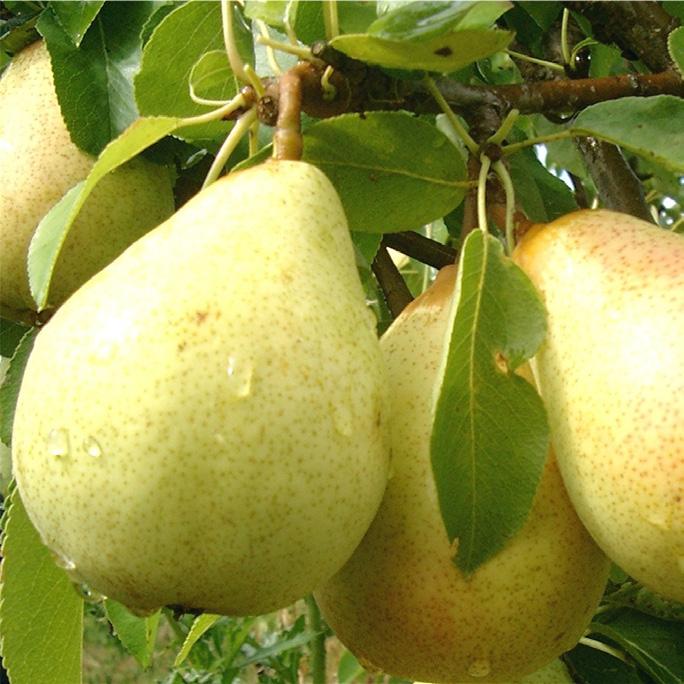
Garden Belle® (Dwarf)
The first true dwarf pear variety in New Zealand, this early-harvesting pear is also self-fertile, making it perfect for small gardens. It tastes best when eaten straight from the tree.
Peaches
Golden Queen
A classic peach that originated in New Zealand. With firm, deep orange flesh, this variety ripens later in the season and is perfect for bottling.
Pixzee (Dwarf)
A dwarf peach that can easily be grown in a large pot on a sunny deck, small garden or balcony. There is no need to prune due to its compact growing habit.
Apples
Blush Babe® (Dwarf)
A miniature apple tree with a compact, mop-top growth habit that makes it ideal for smaller gardens or even in a large container on your balcony. These are perfect for kids as they can reach to harvest the apples themselves.
Royal Gala
Known as one of the world’s most beautiful apples, Royal Gala are best eaten fresh, and taste amazing in fruit salads. These apples are perfect for growing in Auckland’s climate.
Plums
Billington
An early-season variety with tasty medium-sized fruit. As a self-fertile variety, it is ideal for smaller spaces that only have room for one tree.
Santa Rosa
Known as the queen of all plums, Santa Rosa is one of the best-tasting plums in the world! It is a self-fertile variety making it perfect for small properties that have room for only one fruit tree. It is also great for making plum wine.
23
E FAGIOLI Winter Soup Recipe
Our delicious and hearty pasta e fagioli soup is perfect for a cosy winter dinner. The tasty combination of seasonal veggies and aromatic spices creates a rich and flavourful meal that will leave you feeling warm and satisfied. Plus, it can easily be adapted to use up any leftover veggies you may have in your fridge!

Ingredients
1 tablespoon olive oil
1 onion, diced
3 cloves garlic, minced
2 carrots, diced
2 stalks celery, diced
1 cup diced potato
Sprig of thyme
Sprig of rosemary
1 teaspoon paprika
1 teaspoon salt
1/2 teaspoon black pepper
1 can diced tomatoes (400g)
4 cups vegetable broth
1 can cannellini beans (400g), drained and rinsed
1 cup small pasta (such as elbow macaroni)
Grated Parmesan cheese (optional)
Instructions
1. In a large pot, heat the olive oil over medium heat. Add the onion and garlic and sauté until fragrant, about 2-3 minutes.
2. Add the carrots and celery and continue to sauté for another 5-7 minutes, until the vegetables begin to soften.
3. Stir in the potato, thyme, rosemary, paprika, salt, and black pepper. Cook for another 5 minutes.
4. Pour in the diced tomatoes and vegetable broth. Bring the mixture to a boil, then reduce the heat and simmer for 10-15 minutes.
5. Add the cannellini beans and pasta and continue to simmer until the pasta is tender, about 8-10 minutes.
6. Serve hot, topped with grated parmesan cheese if desired.
Expert Tip
Harvest rosemary and thyme in the morning when the leaves are fresh and full of moisture.
PASTA
24
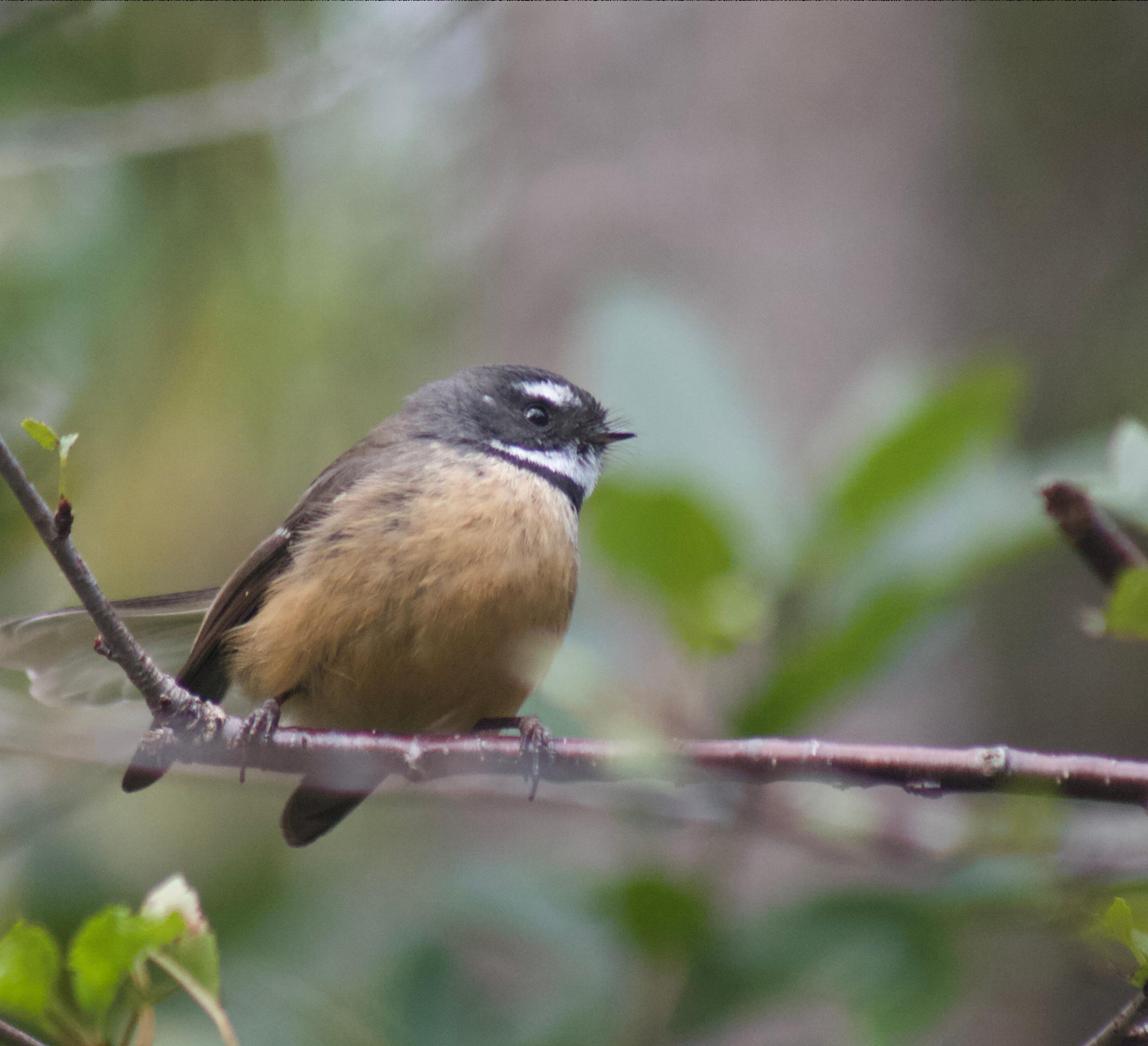





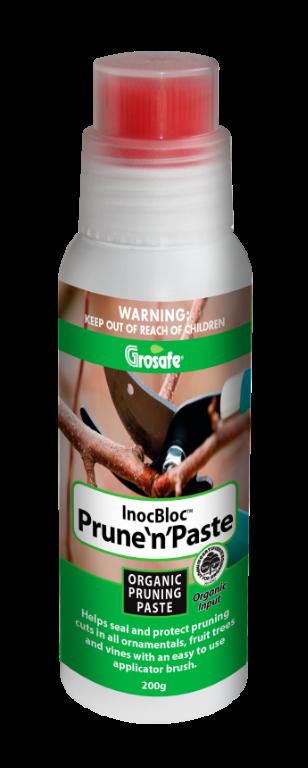
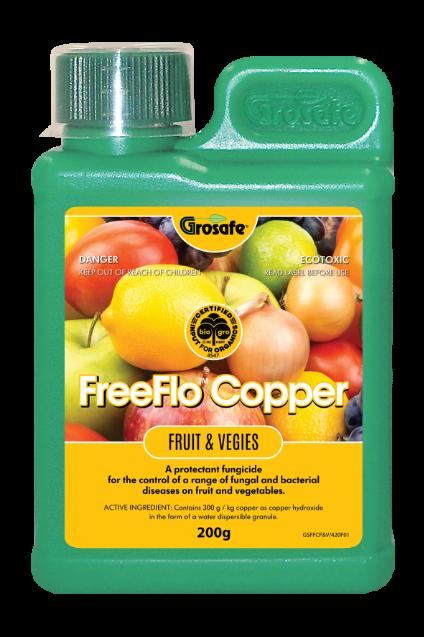
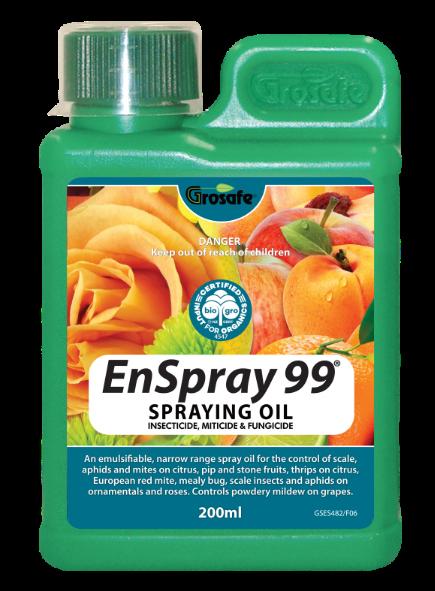
RegisteredpursuanttotheACVMAct1997FreeFlo® CopperNo.P9918, EnSpray99® No.P9104 | FreeFlo® ,InocBloc® andEnSpray® areregisteredtrademarksofGrosafeChemicals. AllproductsareBioGrocertifiedorganic facebook.com/GrosafeNZ instagram.com/GrosafeNZ/ Wintercleanup,thefoundationtoasuccessfulgrowingseason GrosafeGarden TrustedNewZealand Brand 4547 GrosafehasarangeofCopperHydroxides: FreeFlo® CopperFruitandVeggies forfood cropsand FreeFlo® Copper foryour ornamentalsandroses. •Superiorbioavailabilitygivingbetter protectionfromfungalandbacterial pathogens.
persistenceduetofineparticlesize. InocBloc® Prune'n'Paste
pruning pasteonthemarket. Madefrompinetar,themosteffectivewound protectant.
•Nodiseaseresistanceissues. Enspray99 100g TheGrosafeWinterCleanupRangeis availableinKingsPlantBarnstores throughoutNewZealand.
•Superiorefficacy,rainfastnessand
GrosafehastheonlyorganicBioGroregistered
•Easytoapplyandseeonplants.
Lawns
Remove any lingering leaves to prevent parts of the lawn from dying off. Use Kings Lawn Moss Control to prevent moss. Spot spray larger weeds in your lawn now with Turfix Gun.
YOUR WINTER GARDEN TO-DO LIST
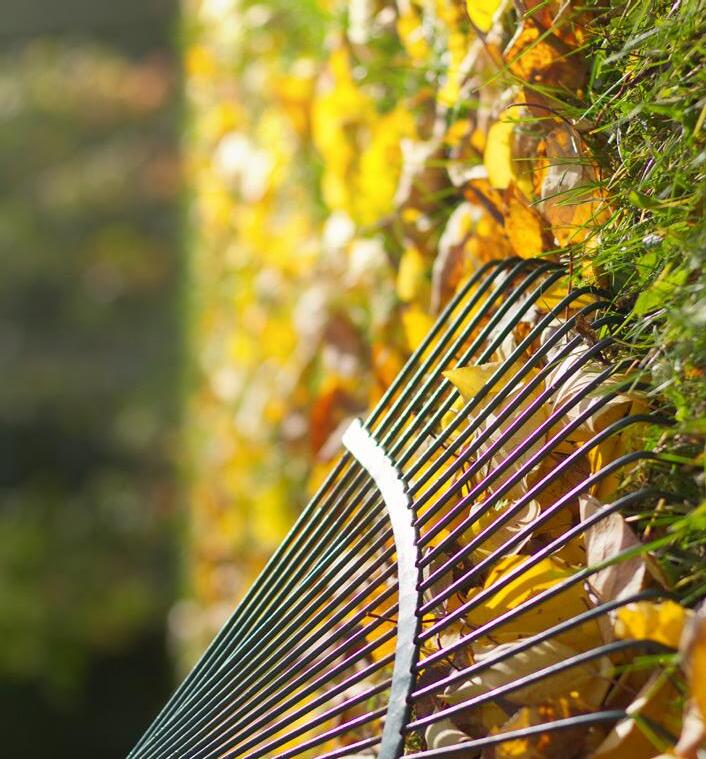
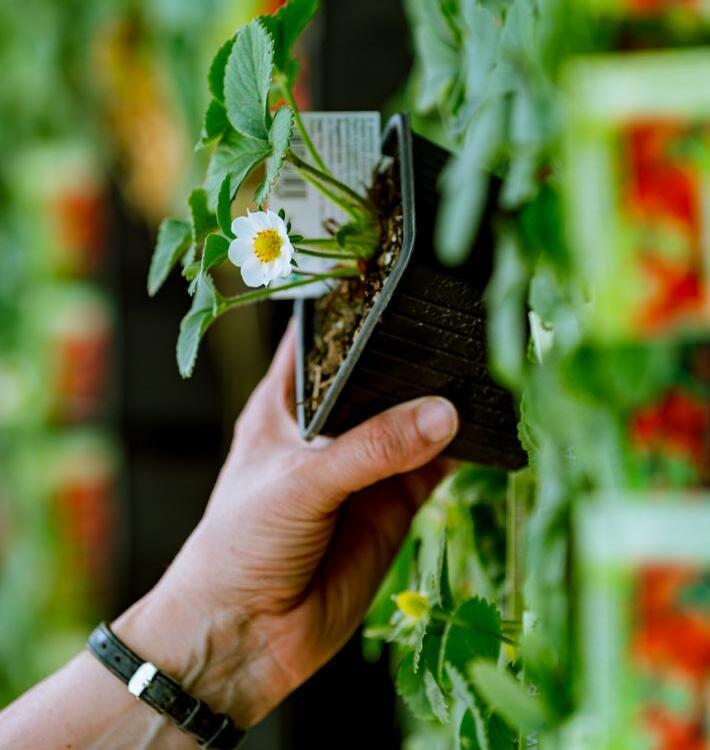
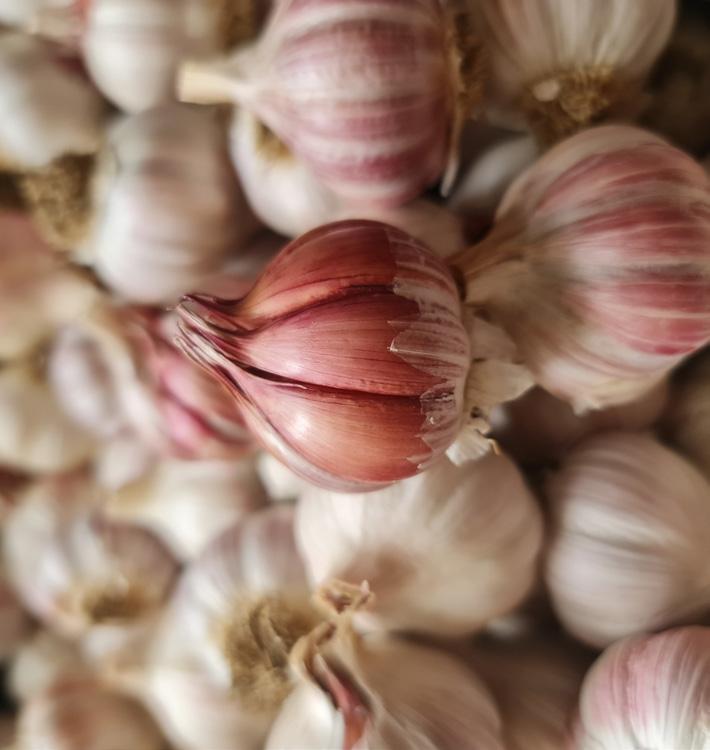
Fruit
Deciduous fruit trees will be arriving in late June. Pre-order specific varieties at your local store to avoid missing out.
Strawberries are back in stock this month! Plant them now so they can get settled and produce a good crop come spring. Cover the soil with strawberry straw to protect the fruit from fungal diseases.
Prune back new growth on established fruit trees on a dry, sunny day and apply pruning paste to all cuts. Spray Yates Lime Sulfur on your deciduous fruit trees only. If you have had leaf curl in the past, gather up all fallen leaves and dispose of them in green-waste bins rather than compost.
Veggies
Continue planting out seedlings, including lettuce, broad beans, onion, broccoli, cauliflower, kale, cabbage, silverbeet, and leek. Plant garlic and shallots now. Depending on how cold your garden gets, protect tender plants and seedlings by covering them with frost cloth. Avoid letting your seedlings get too wet, or they risk collapsing from damping off disease. Protect tender veggies from those pesky slugs and snails with Tui Quash.
June
The cold weather has settled in, the deciduous trees have shed their leaves, and winter is officially upon us. Despite the chill, there’s still plenty to do to keep your garden healthy and thriving.
26
Pin me to the wall!
Indoor plants
Start watering less, keeping an eye on moisture levels by testing the soil with your finger or a moisture meter. Keep plants away from heaters and draughts. Wipe dust off leaves and wash windows for better light levels.
General tasks
Layer up compost with leaves, grass clippings, small branches and other organic matter to build rich compost for spring. Sharpen and clean your garden tools as this will avoid the spread of disease. Add ClayBreaker Gypsum to the soil to help with the breakdown of clay. Harvest veggies as they come ready, to make room for more crops to go in. Sow green crop seeds (Mustard, Lupin and Oats) to bare areas in the veggie patch, which will rejuvenate the soil ready for spring.
A fast-acting weedkiller that is ideal for growing the perfect patch-free lawn.

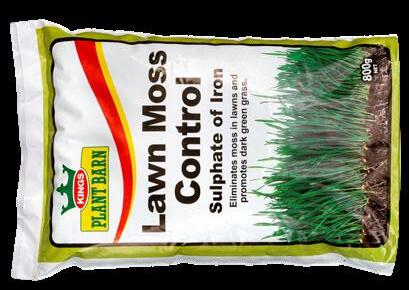
Trees and shrubs
Plant trees, shrubs, hedging, and hardy climbers now. Add a scented touch to your garden with daphne, which grows well in a partly shaded area. Check stakes and ties to ensure they are secure.
Flowers and perennials
Keep your garden looking tidy by deadheading hydrangeas and cutting back any other shrubs, perennials, or annuals that are past their best. Add a pop of winter colour with hellebores and winter annuals like cineraria, pansies, viola, polyanthus, primula, asters, and hardy mini cyclamen. Water cyclamen from the saucer if they are in small pots, but don't allow them to sit in water. Wait until July to start pruning roses.

Grow well with these
JUNE ESSENTIALS
Helps produce healthier grass while controlling moss in your lawn.
Keep slugs and snails off your flowers and veggies with reliable pellets that are safer for use around pets.
 Kings Lawn Moss Control
Yates Turfix
Tui Quash
Kings Lawn Moss Control
Yates Turfix
Tui Quash
27
Flowers and perennials
Winter
YOUR WINTER GARDEN TO-DO LIST
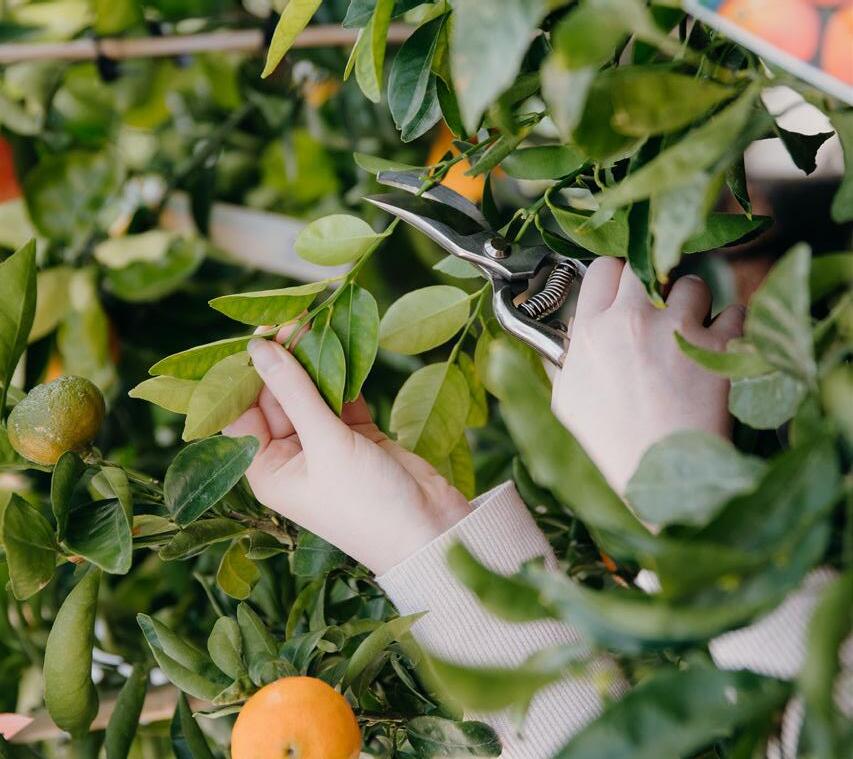
Deadhead any spent winter annuals, perennials and shrubs to encourage new growth. Continue to plant winter annuals in the garden, pots or hanging baskets to add colour to your outdoor space. Plant hellebores to provide bees with food through winter and early spring.
Feed winter annuals with Kings Dried Blood for optimal health.

Fruit Continue planting out strawberries. Spray your deciduous fruit trees with Yates Liquid Copper and EnSpray 99 to kill off overwintering insects and diseases. This will ensure they're healthy and ready to produce fruit come harvest time. Mulch any deciduous trees that have been prone to leaf curl (peach, plum, nectarine) with Magic Moss. Prune back branches to help shape your fruit trees for the coming growing season. Do it on a fine day and use pruning paste afterwards for best results.
Veggies
Continue protecting your veggies from frost with frost cloth, and make sure your seedlings aren't getting too wet, or they may die from damping off.
Mulch your garden bed with pea straw to help suppress weeds. Keep slugs and snails at bay with Quash or your own homemade beer-trap. Store your seed potatoes in a cool, well-lit spot until they have 1-2cm shoots. Plant out new season asparagus crowns.
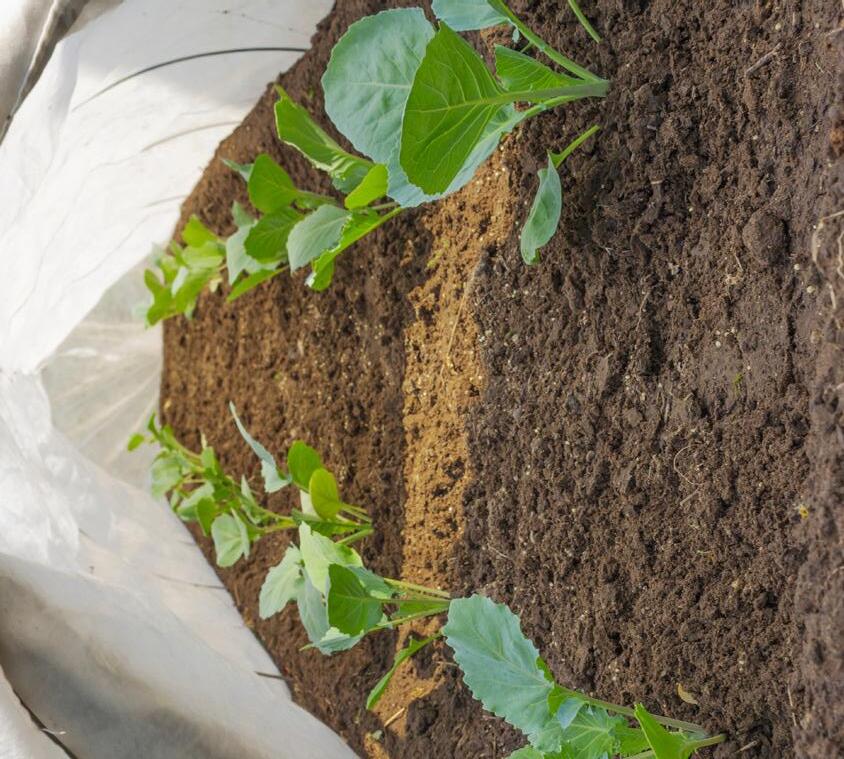
July
28
in Auckland can be chilly and overcast, with lots of rain. Don’t let the gloomy weather get you down, this is the best time to finish your winter clean-up, and start planning for spring.
Indoor plants
Cut back any dead, browning leaves. Yellow and curling leaves at this time of year can indicate cold damage, so increase the room temperature or move plants closer to an indirect light source.
General tasks
Remember to turn over your compost, and add leaf matter, cardboard and newspaper for layering. Clean pruning tools now and ensure they are in good condition. Clean out gutters once all deciduous leaves have fallen to avoid blockages. Chop up and dig in any green crops before they flower and start preparing your beds for spring planting.
GroSafe EnSpray 99
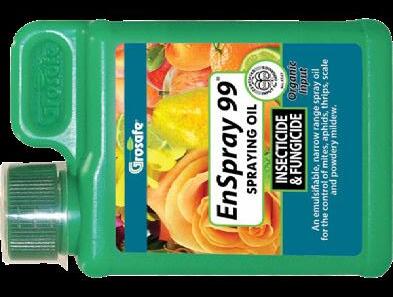
Doubling both as an insecticide and a fungicide, this allpurpose oil is also certified organic.
Trees and shrubs
Feed daphnes and camellias with acidic food such as Kings Azalea, Camellia & Rhododendron Fertiliser. Transplant any small trees or shrubs you want to move now, making sure their roots remain moist when replanting.
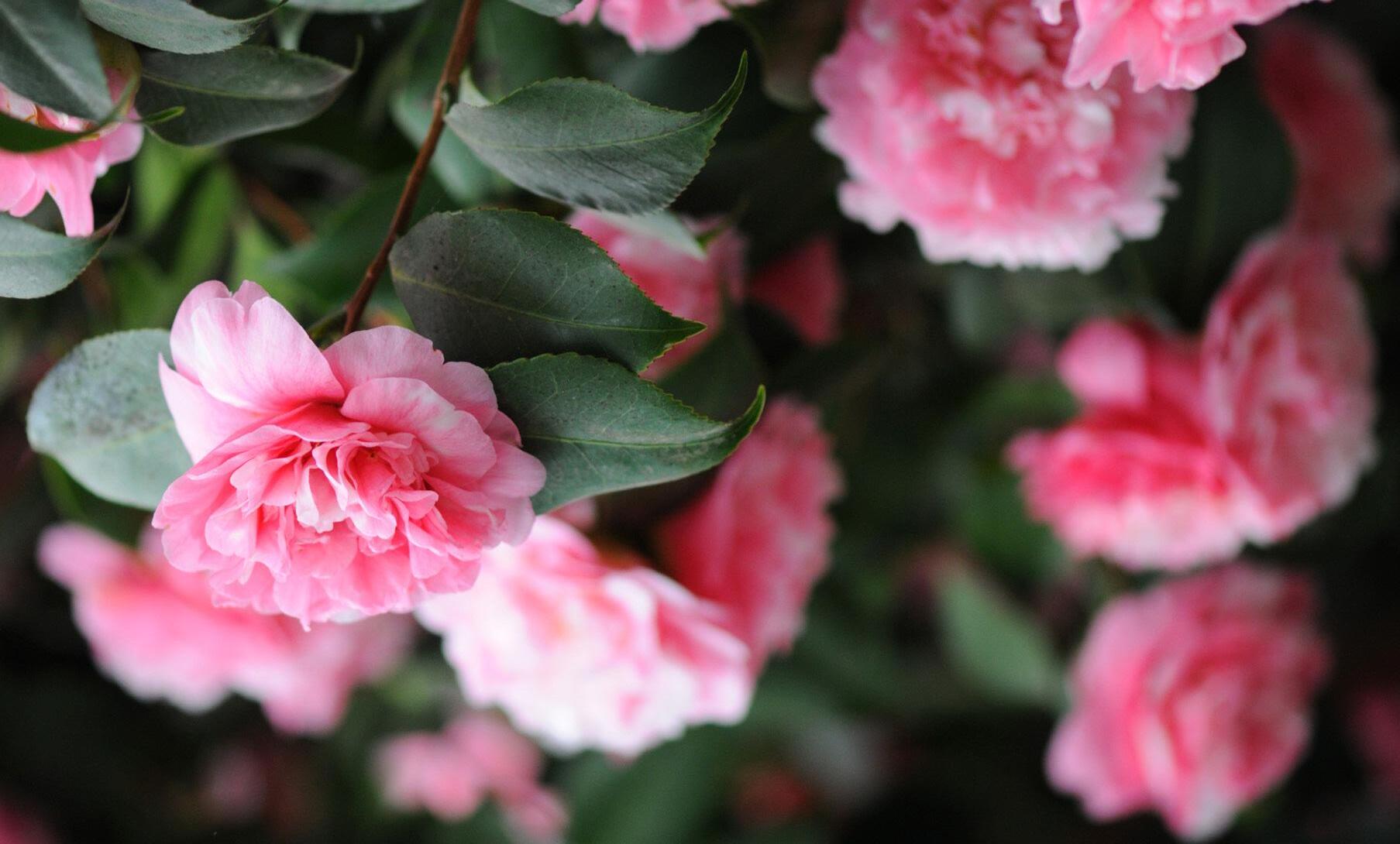
Prune your roses in the first couple of weeks of July, choosing a dry, sunny day for best results. Use pruning paste to seal any cuts. Spray Yates Lime Sulfur to defoliate roses that are still in leaf to kill off any fungal spores. Take care when spraying as this product can stain fences and paving.
Lawns Continue moss prevention with Kings Lawn Moss Control. Spot spray and take out any larger or harder-to-get weed by hand. Remove any fallen flowers from the lawn and add them to your compost. Lift your mower blade setting so it doesn’t scalp wet lawns.
Grow well with these
Kings Dried Blood
A great general fertiliser with plenty of nitrogen to encourage leafy foliage. Especially good for polyanthus, pansies, and primulas.
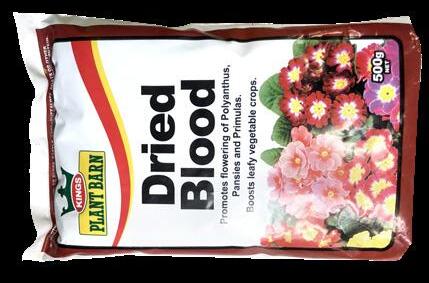
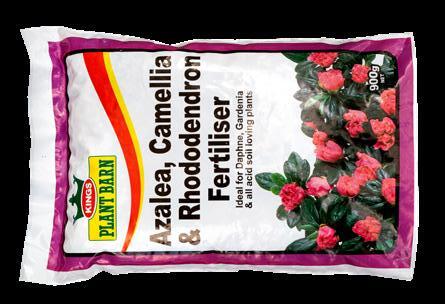
Kings Azalea, Camellia, Rhododendron Fertiliser
JULY ESSENTIALS
A formulated plant food containing nutrients for healthy growth and prolific flowering in acid-loving plants.
29
Flowers and perennials
Deadhead old blooms as they fade, as this encourages repeat flowering. Early spring bulbs may now be floweringtry cutting and gifting to a friend or family member. Start planting summer bulbs now. Feed pansies and polyanthus with Kings Dried Blood and the rest of your garden with Kings Blood & Bone.
YOUR WINTER GARDEN TO-DO LIST
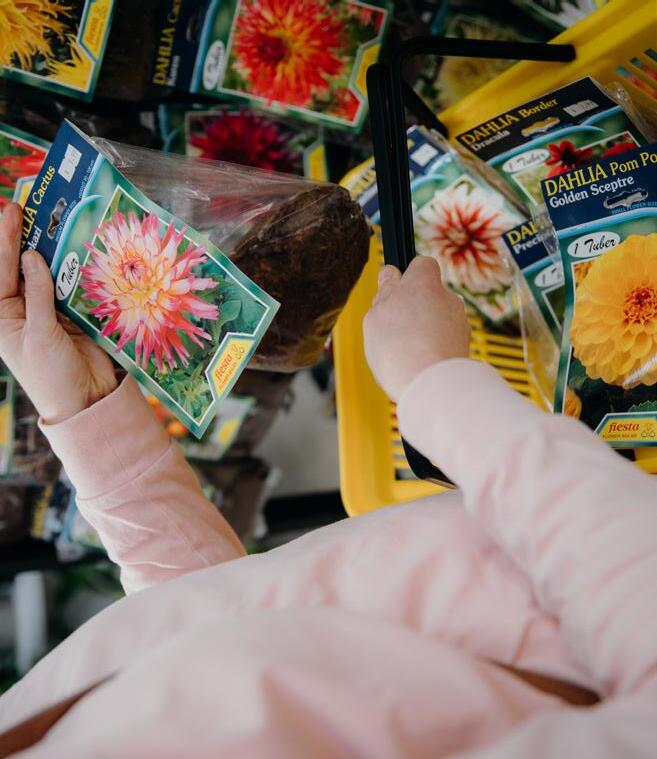
Fruit
Don’t forget to buy your deciduous fruit trees now. Spray with Yates Liquid Copper before bud-burst to help lessen the effects of fungal diseases such as shot hole and leaf curl. If you are going to graft or espalier fruit trees, do this in late-August to midSeptember.
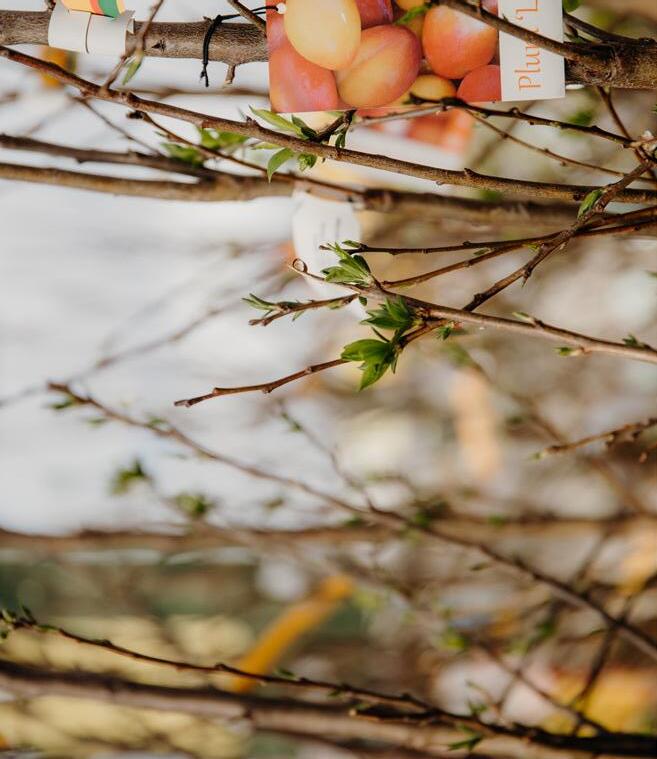
Veggies Now is the time to start feeding your veggies regularly with Kings Organic Vegetable Fertiliser. Sow tomato, basil, and chilli seeds indoors, before transplanting them outside in September. While it may be too early to plant basil outdoors, you can still plant parsley, coriander, thyme and mint. Sow spring seeds into seed-raising mix now, including peas, beans, lettuce, celery, broccoli, and cauliflower. Plant potatoes now to enjoy a bountiful harvest later on.
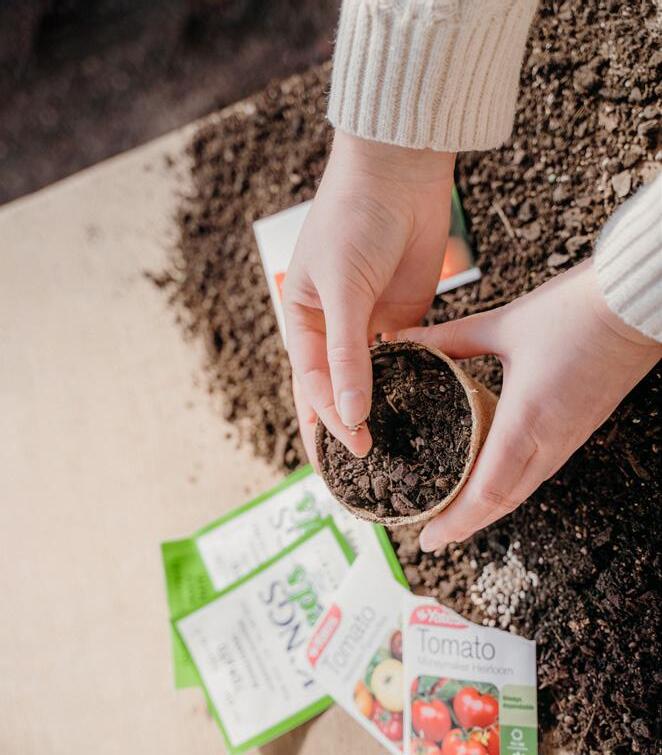
August
30
With the arrival of August, the days gradually get longer and spring begins to appear in the garden once again. There is much to do to get your garden ready for the upcoming spring.
Indoor plants
Start repotting at the end of August, using Kings House Plant Mix. Rotate plants that have been stretching towards the light. Start fertilising with Kings Liquid House Plant Food.
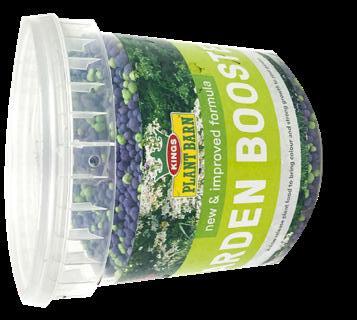
General
Consider making your own compost bin if you have the space. Get rid of weeds before they get out of hand. Put up wasp traps as queens begin to come out of hibernation. Cut down your green crops in early August and dig them into your garden beds.
Kings Garden Booster
Highly effective and complete plant food that promotes greener, healthier plants with enhanced fruit and vegetable production.
Yates Liquid Copper
A copper-based fungicide that is an all-round solution for fungus control in fruit, vegetables, and ornamentals.
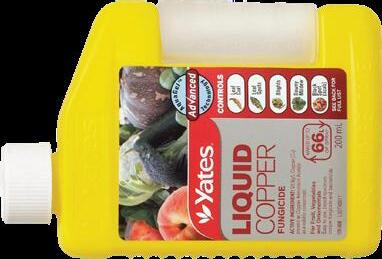
Kings Organic Veggie Fertiliser
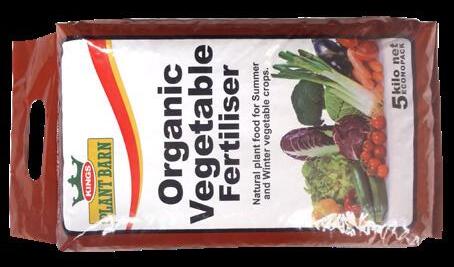
An excellent organic plant food that is rich in nutrients to boost your vegetable garden.
Trees and shrubs
Magnolias and flowering cherries will arrive in stores this monthplant them early to enjoy their beautiful blooms this spring. Mulch around trees with Living Earth More Than Mulch. Feed the whole garden with Kings Garden Booster.
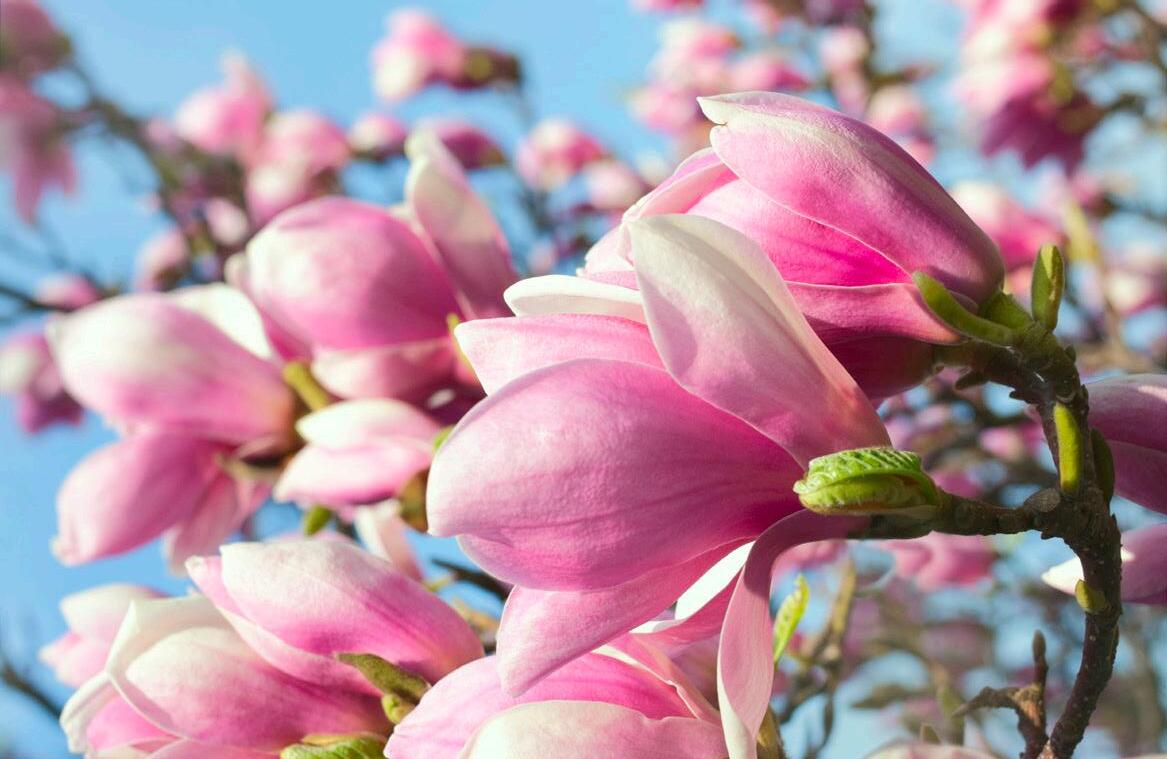
Mulch roses well and give them a final spray using Yates Liquid Copper before bud-burst. Remove any fallen camellia flowers, as these can be slippery when left on the ground. Add these to your compost.
Trim and shape early flowering camellias once blooms have finished.
Lawns As it warms up, begin to repair your lawn or sow any new patches. If moss has become a problem, apply Kings Lawn Moss Control, but be careful around paving as it can stain.
Grow well with these
AUGUST ESSENTIALS
31
Love Plants? Join the club! Signing up is easy! Ask instore at checkout or go to kings.co.nz Earn points so you can buy more plants $1 = 1 point, earn 300 points and score yourself a $10 voucher! Be the first to know Early alerts for sales, new arrivals and the latest plant news and tips. Wednesdays are wonderful if you're 65+ 10% off plants every Wednesday for SuperGold card holders. Exclusive specials & events just for you Personalised offers plus weekly member only deals & event invites. Helping you grow well Score yourself a birthday freebie! Get a $10 voucher on your birthday to spend instore or online.
























































































 Piece of Cake
Gertrude Jeckyll
Green with Envy
Margaret Merrill
Blackberry Nip
Piece of Cake
Gertrude Jeckyll
Green with Envy
Margaret Merrill
Blackberry Nip



































 Kings Lawn Moss Control
Yates Turfix
Tui Quash
Kings Lawn Moss Control
Yates Turfix
Tui Quash













